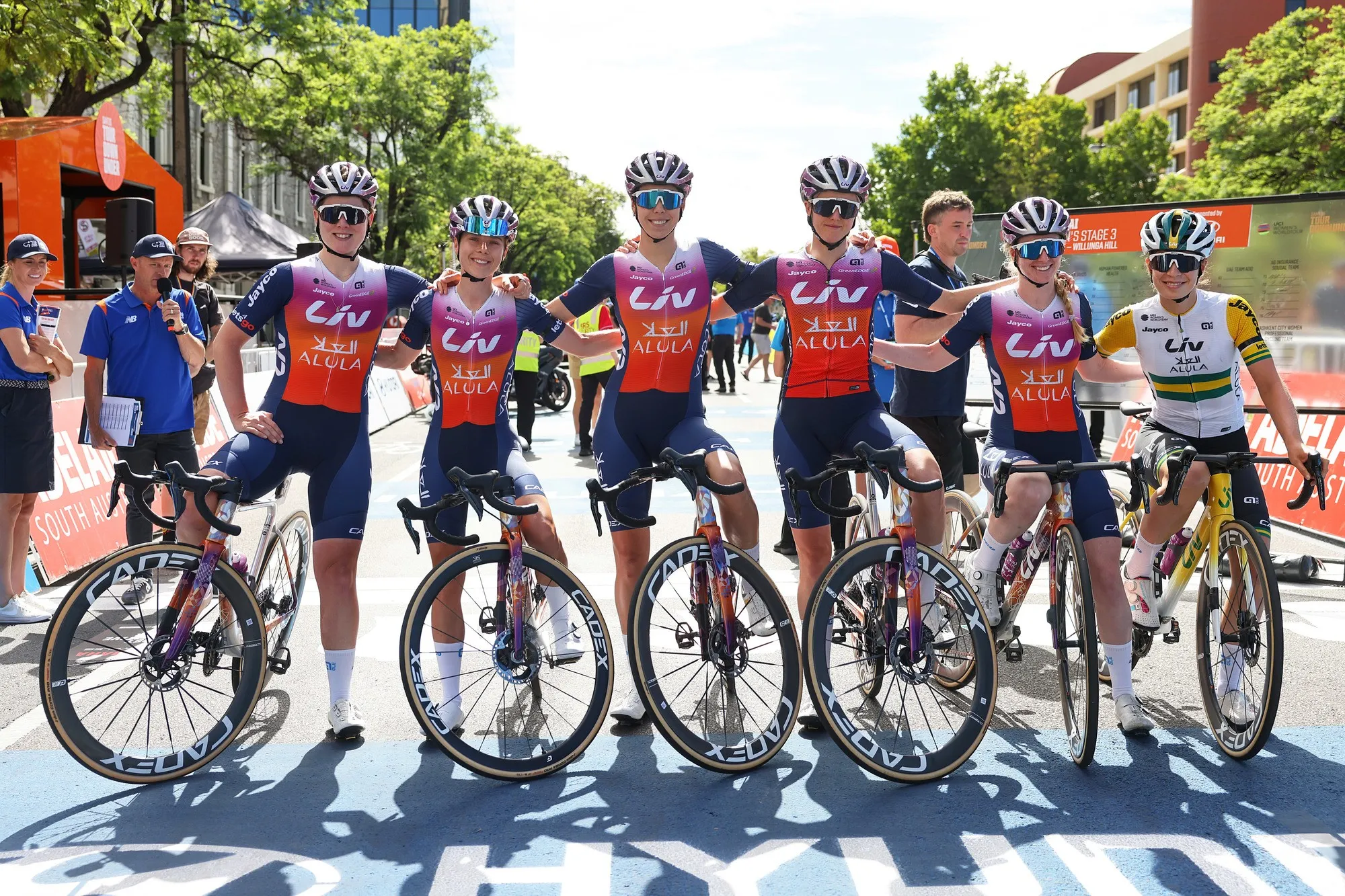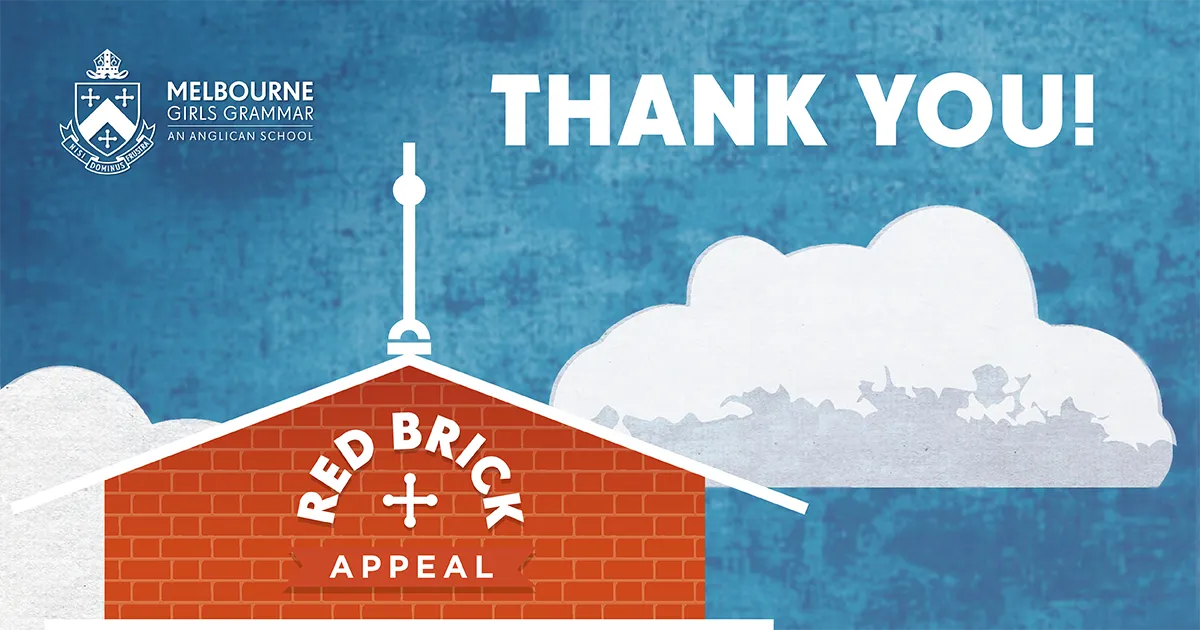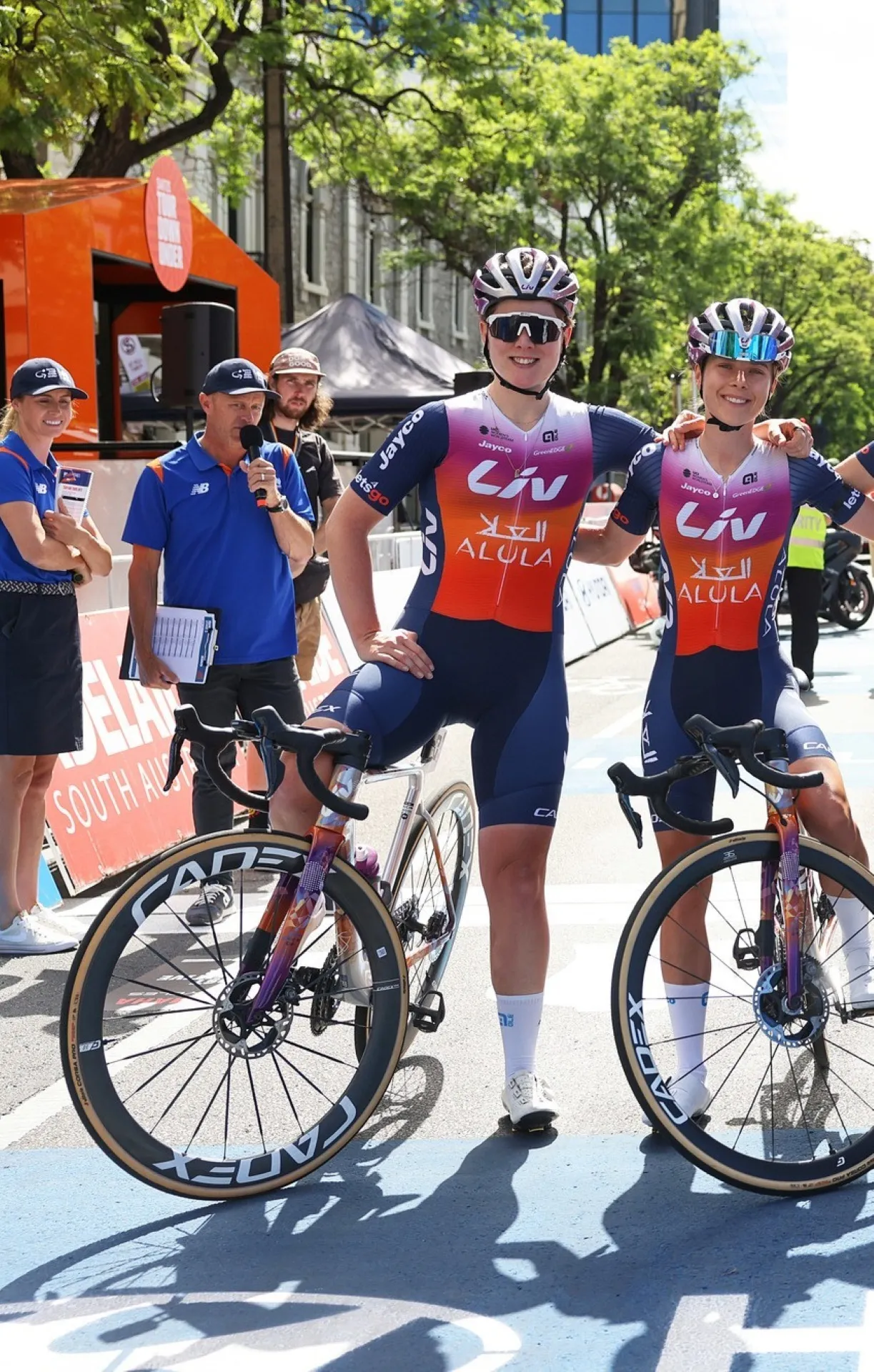

Georgie Howe (2013)


Georgie Howe (2013)
Bright Futures Ahead
From rowing to cycling and scoring goals, the talent of our Grammarians never ceases to inspire. These talented Grammarians are bold, fearless and determined.
Please enjoy reading about the achievements of Old Grammarians Georgie Howe (2012), Abbie McKay (2018) and brand new Old Grammarian, Abbie's sister, Sophie McKay (2024). We look forward to continuing to follow their careers and sharing the highlights of their personal and professional development since leaving MGGS.

Georgie Howe (2012)
After a decade of living a nomadic lifestyle, Georgie Howe (2013) is excited to return to Australia for summer. Her life has been defined by constant movement and a blend of education, sports and personal growth.
Since graduating from Melbourne Girls Grammar in 2012, Georgie has lived in multiple locations around the world, with her time at MGGS and Princeton University standing out as key points in her journey. Georgie recalls her introduction to rowing at MGGS and appreciates that the coaches prioritised the enjoyment of the sport for the students.
“I think that MGGS really set me up for success. I was very lucky with the coaches that I had at the time, they really prioritised fun, and performance followed that. When coaching kids, I believe it’s really important to make it fun and motivate them that way. People who make it really outcome driven / outcome focused kind of take the fun out of the process and out of the team environment. That's when burnout happens, and you don't find as much success.”
At MGGS, Georgie was part of the First VIII that won the national schoolgirl titles at the Australian Rowing Championships in 2011 and 2012. She later rowed for Melbourne University Boat Club, winning a national title in the women’s coxless four at the 2013 Australian Championships.
It was during her final years of school at MGGS, that Georgie developed an interest in classical studies, leading her to choose classics as her field of study at Princeton, where she earned a rowing scholarship.
Her coach at Princeton, Lori Dauphiny, was a key influence on her growth, fostering a team culture built around enjoyment and motivation. This approach to sport – focused on personal fulfillment over purely competitive outcomes – would become a cornerstone of her professional career.
“I think that MGGS really set me up for success. I was very lucky with the coaches that I had at the time, they really prioritised fun, and performance followed that.”
Georgie Howe (2012)
After a decade of living a nomadic lifestyle, Georgie Howe (2013) is excited to return to Australia for summer. Her life has been defined by constant movement and a blend of education, sports and personal growth.
Since graduating from Melbourne Girls Grammar in 2012, Georgie has lived in multiple locations around the world, with her time at MGGS and Princeton University standing out as key points in her journey. Georgie recalls her introduction to rowing at MGGS and appreciates that the coaches prioritised the enjoyment of the sport for the students.
“I think that MGGS really set me up for success. I was very lucky with the coaches that I had at the time, they really prioritised fun, and performance followed that. When coaching kids, I believe it’s really important to make it fun and motivate them that way. People who make it really outcome driven / outcome focused kind of take the fun out of the process and out of the team environment. That's when burnout happens, and you don't find as much success.”
At MGGS, Georgie was part of the First VIII that won the national schoolgirl titles at the Australian Rowing Championships in 2011 and 2012. She later rowed for Melbourne University Boat Club, winning a national title in the women’s coxless four at the 2013 Australian Championships.
It was during her final years of school at MGGS, that Georgie developed an interest in classical studies, leading her to choose classics as her field of study at Princeton, where she earned a rowing scholarship.
Her coach at Princeton, Lori Dauphiny, was a key influence on her growth, fostering a team culture built around enjoyment and motivation. This approach to sport – focused on personal fulfillment over purely competitive outcomes – would become a cornerstone of her professional career.
“I think that MGGS really set me up for success. I was very lucky with the coaches that I had at the time, they really prioritised fun, and performance followed that.”
Georgie Howe (2012)
After a decade of living a nomadic lifestyle, Georgie Howe (2013) is excited to return to Australia for summer. Her life has been defined by constant movement and a blend of education, sports and personal growth.
Since graduating from Melbourne Girls Grammar in 2012, Georgie has lived in multiple locations around the world, with her time at MGGS and Princeton University standing out as key points in her journey. Georgie recalls her introduction to rowing at MGGS and appreciates that the coaches prioritised the enjoyment of the sport for the students.
“I think that MGGS really set me up for success. I was very lucky with the coaches that I had at the time, they really prioritised fun, and performance followed that. When coaching kids, I believe it’s really important to make it fun and motivate them that way. People who make it really outcome driven / outcome focused kind of take the fun out of the process and out of the team environment. That's when burnout happens, and you don't find as much success.”
At MGGS, Georgie was part of the First VIII that won the national schoolgirl titles at the Australian Rowing Championships in 2011 and 2012. She later rowed for Melbourne University Boat Club, winning a national title in the women’s coxless four at the 2013 Australian Championships.
It was during her final years of school at MGGS, that Georgie developed an interest in classical studies, leading her to choose classics as her field of study at Princeton, where she earned a rowing scholarship.
Her coach at Princeton, Lori Dauphiny, was a key influence on her growth, fostering a team culture built around enjoyment and motivation. This approach to sport – focused on personal fulfillment over purely competitive outcomes – would become a cornerstone of her professional career.
“I think that MGGS really set me up for success. I was very lucky with the coaches that I had at the time, they really prioritised fun, and performance followed that.”
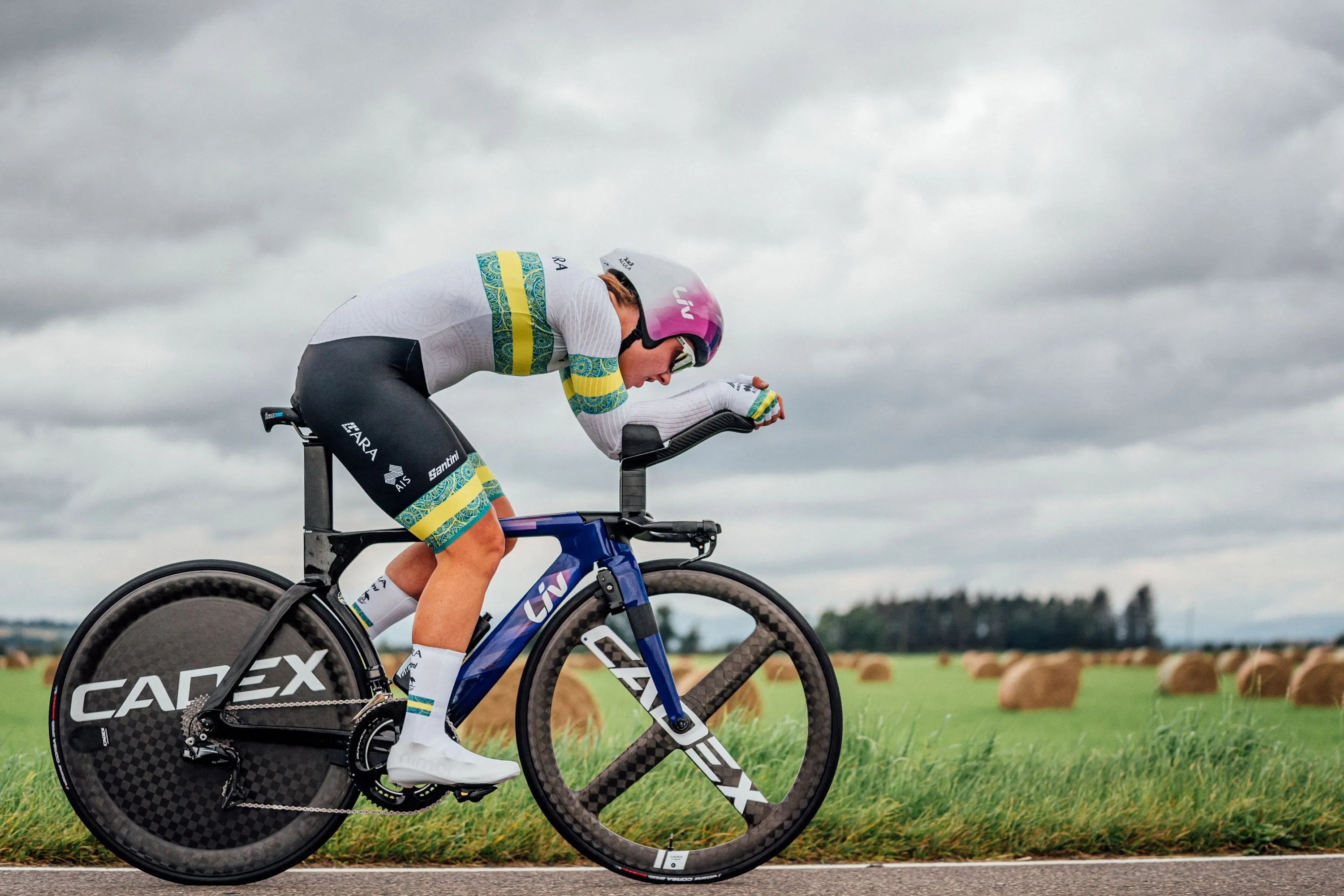

Georgie at the Women's time trial of the 2023 UCI Road World Championships in Stirling, Scotland. She finished 10th.



Georgie at the Women's time trial of the 2023 UCI Road World Championships in Stirling, Scotland. She finished 10th.

Balancing academics and rowing, she competed in Australia’s National Team during the summers, an experience that shaped her passion for sports. At Princeton, Georgie rowed in the Senior Varsity VIII from 2014 to 2017, winning three Ivy League titles and earning First Team All-Ivy League honours in her senior year, while also serving as team co-captain. She made her Australian debut in 2014 as part of the U23 women’s eight at the World Championships, and later represented Australia in the senior women’s eight at the 2015 World Rowing Championships. Georgie also competed in the coxless four at the 2015 U23 World Championships, earning top-four finishes in both events, and later went on to win the Queen's Cup with Victoria in 2019.
After her time at Princeton, Georgie continued to row competitively, but in 2019, she decided to step away from the sport. Disillusioned by the politics surrounding the rowing world, she realised she wasn’t enjoying the sport anymore. Georgie’s inner voice saying, “If you’re not having fun, what’s the point?” was the catalyst for her departure. Around this time, she began working at Ernst and Young (EY), where she dedicated herself fully to her career.
The onset of the COVID-19 pandemic in 2020 brought an unexpected twist. With gyms closed and outdoor activities limited, Georgie turned to indoor cycling as a way to stay fit. What began as a simple hobby soon reignited her passion for endurance sports. Through platforms like Zwift, she connected with friends, fuelling her interest in cycling.
It wasn’t long before Nick Owen, an old colleague and cycling coach, spotted her potential and invited her to try racing. Although Georgie originally had no intention of going professional, Nick's focus on making cycling fun, rather than solely performance-driven, resonated with her, much like her rowing experience.
By 2022, Georgie had fully transitioned into competitive cycling. She raced in events like the Australian Nationals and later travelled to Europe, racing in Belgium. “It was terrifying because racing in Europe is not like racing in Australia. You've got these roads that are no bigger than bike paths with 160 women trying to fight for position. It's at 50 kilometres an hour. I had to learn pretty quickly. But from those results over there, I then was able to sign with a professional team.”
By early 2023, she signed with Gerry Ryan’s professional team, Liv AlUla Jacyo. The move from rowing to cycling was an unexpected but exciting career shift, and she left her job at EY to commit to the sport full-time.
Reflecting on her transition, Georgie credits much of her success to the people she’s met along the way and the enjoyment she finds in the process. Her approach to cycling, much like her approach to rowing, is centred around the experience and the community rather than chasing results. However, the transition to professional cycling hasn't been without its challenges. Rapid weight changes and strain on her body led to some health issues, prompting a necessary break. The cycling season is gruelling, with riders training 22 to 27 hours per week and races happening almost year-round.
Reflecting on her participation in events like the Tour de France Femme, Georgie is pleased with the growing visibility and popularity of women’s cycling. She noted the excitement around the women’s racing. “You could just see this meteoric rise of women cycling in Europe in terms of the fan base and France is a great example of that. Like riding up the Tourmalet last year with fans all the way up the mountain, there was not a stretch of concrete that didn't have fans on it. Names sponsored on the road and everything, and then like seeing all these young women and girls coming out to watch as well, was really cool because soon they'll be getting into the sport where that's just normal.”
For young athletes coming through Melbourne Girls Grammar, Georgie advises to focus on enjoyment and the relationships formed along the way. She notes that, while professional success can be a goal, it should never be the sole focus. Building a strong, supportive network and keeping the joy of the sport at the core of one’s journey is what truly leads to long-term success.
Looking ahead, Georgie plans to take a break from competitive cycling in 2025 to give her body time to recover. While stepping away from racing, she plans to stay involved in the sport, transitioning into partnership and relationship management. This shift is not about leaving cycling behind, but rather about taking the time to rest and explore new challenges in the business side of the sport. “I've decided I'm not as pliable as I once was, at the age of 30. Not as pliable as my 21-year-old self physically. I am struggling with some health concerns at the moment, just from the meteoric rise in cycling, which has been phenomenal and great, and I have loved every second of it. But I think it has come at a cost. My body is taking a while to catch up and it's finally put its hand up and said, ‘We need a break’. My body has given me a wealth of experiences over my life, so I think it's time for me to give it some TLC. So, I'm taking a break from the bike in 2025, but I won't be off the bike completely, and I'm looking to continue my career in sport in the realm of partnership management, relationship management within a team or a brand. So don't really know what next year will hold, or where I'll be, but I'm really excited for the challenge that it presents.”
When asked about what she enjoys during her down time, Georgie says that cooking is her love language. She loves to cook for her friends and bring them together that way, finding the process meditative. The beach is another favoured way to spend her downtime in nature.
Reflecting on the foundation of her journey, Georgie credits her time at MGGS, where the focus was always on building strong, independent individuals. This ethos of putting people first, has shaped both her athletic and professional careers.
“It [MGGS] really is such a special place. I think it's because they prioritise building a good person. Everything about my experience there was positive, particularly in rowing. They carried on the ethos of the School, which is like we're just going to build strong, independent women who love themselves, who believe in themselves, who can go into the world and do good. Then from that comes the athletics, comes the academic achievements, it's always a people first and human first mentality when it comes to Melbourne Girls Grammar, which I really appreciated.”
When asked what advice she would give younger athletes, Georgie shares: “It can be a goal, but it shouldn't be the be all and end all. If you keep fun and enjoyment at the centre of whatever you do, be it sport or in life, things usually work out for the best. So, my advice would be just prioritise the people around you and the fun in what you're doing.”
“It [MGGS] really is such a special place. I think it's because they prioritise building a good person. (...) it's always a people first and human first mentality when it comes to Melbourne Girls Grammar, which I really appreciated.”
Balancing academics and rowing, she competed in Australia’s National Team during the summers, an experience that shaped her passion for sports. At Princeton, Georgie rowed in the Senior Varsity VIII from 2014 to 2017, winning three Ivy League titles and earning First Team All-Ivy League honours in her senior year, while also serving as team co-captain. She made her Australian debut in 2014 as part of the U23 women’s eight at the World Championships, and later represented Australia in the senior women’s eight at the 2015 World Rowing Championships. Georgie also competed in the coxless four at the 2015 U23 World Championships, earning top-four finishes in both events, and later went on to win the Queen's Cup with Victoria in 2019.
After her time at Princeton, Georgie continued to row competitively, but in 2019, she decided to step away from the sport. Disillusioned by the politics surrounding the rowing world, she realised she wasn’t enjoying the sport anymore. Georgie’s inner voice saying, “If you’re not having fun, what’s the point?” was the catalyst for her departure. Around this time, she began working at Ernst and Young (EY), where she dedicated herself fully to her career.
The onset of the COVID-19 pandemic in 2020 brought an unexpected twist. With gyms closed and outdoor activities limited, Georgie turned to indoor cycling as a way to stay fit. What began as a simple hobby soon reignited her passion for endurance sports. Through platforms like Zwift, she connected with friends, fuelling her interest in cycling.
It wasn’t long before Nick Owen, an old colleague and cycling coach, spotted her potential and invited her to try racing. Although Georgie originally had no intention of going professional, Nick's focus on making cycling fun, rather than solely performance-driven, resonated with her, much like her rowing experience.
By 2022, Georgie had fully transitioned into competitive cycling. She raced in events like the Australian Nationals and later travelled to Europe, racing in Belgium. “It was terrifying because racing in Europe is not like racing in Australia. You've got these roads that are no bigger than bike paths with 160 women trying to fight for position. It's at 50 kilometres an hour. I had to learn pretty quickly. But from those results over there, I then was able to sign with a professional team.”
By early 2023, she signed with Gerry Ryan’s professional team, Liv AlUla Jacyo. The move from rowing to cycling was an unexpected but exciting career shift, and she left her job at EY to commit to the sport full-time.
Reflecting on her transition, Georgie credits much of her success to the people she’s met along the way and the enjoyment she finds in the process. Her approach to cycling, much like her approach to rowing, is centred around the experience and the community rather than chasing results. However, the transition to professional cycling hasn't been without its challenges. Rapid weight changes and strain on her body led to some health issues, prompting a necessary break. The cycling season is gruelling, with riders training 22 to 27 hours per week and races happening almost year-round.
Reflecting on her participation in events like the Tour de France Femme, Georgie is pleased with the growing visibility and popularity of women’s cycling. She noted the excitement around the women’s racing. “You could just see this meteoric rise of women cycling in Europe in terms of the fan base and France is a great example of that. Like riding up the Tourmalet last year with fans all the way up the mountain, there was not a stretch of concrete that didn't have fans on it. Names sponsored on the road and everything, and then like seeing all these young women and girls coming out to watch as well, was really cool because soon they'll be getting into the sport where that's just normal.”
For young athletes coming through Melbourne Girls Grammar, Georgie advises to focus on enjoyment and the relationships formed along the way. She notes that, while professional success can be a goal, it should never be the sole focus. Building a strong, supportive network and keeping the joy of the sport at the core of one’s journey is what truly leads to long-term success.
Looking ahead, Georgie plans to take a break from competitive cycling in 2025 to give her body time to recover. While stepping away from racing, she plans to stay involved in the sport, transitioning into partnership and relationship management. This shift is not about leaving cycling behind, but rather about taking the time to rest and explore new challenges in the business side of the sport. “I've decided I'm not as pliable as I once was, at the age of 30. Not as pliable as my 21-year-old self physically. I am struggling with some health concerns at the moment, just from the meteoric rise in cycling, which has been phenomenal and great, and I have loved every second of it. But I think it has come at a cost. My body is taking a while to catch up and it's finally put its hand up and said, ‘We need a break’. My body has given me a wealth of experiences over my life, so I think it's time for me to give it some TLC. So, I'm taking a break from the bike in 2025, but I won't be off the bike completely, and I'm looking to continue my career in sport in the realm of partnership management, relationship management within a team or a brand. So don't really know what next year will hold, or where I'll be, but I'm really excited for the challenge that it presents.”
When asked about what she enjoys during her down time, Georgie says that cooking is her love language. She loves to cook for her friends and bring them together that way, finding the process meditative. The beach is another favoured way to spend her downtime in nature.
Reflecting on the foundation of her journey, Georgie credits her time at MGGS, where the focus was always on building strong, independent individuals. This ethos of putting people first, has shaped both her athletic and professional careers.
“It [MGGS] really is such a special place. I think it's because they prioritise building a good person. Everything about my experience there was positive, particularly in rowing. They carried on the ethos of the School, which is like we're just going to build strong, independent women who love themselves, who believe in themselves, who can go into the world and do good. Then from that comes the athletics, comes the academic achievements, it's always a people first and human first mentality when it comes to Melbourne Girls Grammar, which I really appreciated.”
When asked what advice she would give younger athletes, Georgie shares: “It can be a goal, but it shouldn't be the be all and end all. If you keep fun and enjoyment at the centre of whatever you do, be it sport or in life, things usually work out for the best. So, my advice would be just prioritise the people around you and the fun in what you're doing.”
“It [MGGS] really is such a special place. I think it's because they prioritise building a good person. (...) it's always a people first and human first mentality when it comes to Melbourne Girls Grammar, which I really appreciated.”
Balancing academics and rowing, she competed in Australia’s National Team during the summers, an experience that shaped her passion for sports. At Princeton, Georgie rowed in the Senior Varsity VIII from 2014 to 2017, winning three Ivy League titles and earning First Team All-Ivy League honours in her senior year, while also serving as team co-captain. She made her Australian debut in 2014 as part of the U23 women’s eight at the World Championships, and later represented Australia in the senior women’s eight at the 2015 World Rowing Championships. Georgie also competed in the coxless four at the 2015 U23 World Championships, earning top-four finishes in both events, and later went on to win the Queen's Cup with Victoria in 2019.
After her time at Princeton, Georgie continued to row competitively, but in 2019, she decided to step away from the sport. Disillusioned by the politics surrounding the rowing world, she realised she wasn’t enjoying the sport anymore. Georgie’s inner voice saying, “If you’re not having fun, what’s the point?” was the catalyst for her departure. Around this time, she began working at Ernst and Young (EY), where she dedicated herself fully to her career.
The onset of the COVID-19 pandemic in 2020 brought an unexpected twist. With gyms closed and outdoor activities limited, Georgie turned to indoor cycling as a way to stay fit. What began as a simple hobby soon reignited her passion for endurance sports. Through platforms like Zwift, she connected with friends, fuelling her interest in cycling.
It wasn’t long before Nick Owen, an old colleague and cycling coach, spotted her potential and invited her to try racing. Although Georgie originally had no intention of going professional, Nick's focus on making cycling fun, rather than solely performance-driven, resonated with her, much like her rowing experience.
By 2022, Georgie had fully transitioned into competitive cycling. She raced in events like the Australian Nationals and later travelled to Europe, racing in Belgium. “It was terrifying because racing in Europe is not like racing in Australia. You've got these roads that are no bigger than bike paths with 160 women trying to fight for position. It's at 50 kilometres an hour. I had to learn pretty quickly. But from those results over there, I then was able to sign with a professional team.”
By early 2023, she signed with Gerry Ryan’s professional team, Liv AlUla Jacyo. The move from rowing to cycling was an unexpected but exciting career shift, and she left her job at EY to commit to the sport full-time.
Reflecting on her transition, Georgie credits much of her success to the people she’s met along the way and the enjoyment she finds in the process. Her approach to cycling, much like her approach to rowing, is centred around the experience and the community rather than chasing results. However, the transition to professional cycling hasn't been without its challenges. Rapid weight changes and strain on her body led to some health issues, prompting a necessary break. The cycling season is gruelling, with riders training 22 to 27 hours per week and races happening almost year-round.
Reflecting on her participation in events like the Tour de France Femme, Georgie is pleased with the growing visibility and popularity of women’s cycling. She noted the excitement around the women’s racing. “You could just see this meteoric rise of women cycling in Europe in terms of the fan base and France is a great example of that. Like riding up the Tourmalet last year with fans all the way up the mountain, there was not a stretch of concrete that didn't have fans on it. Names sponsored on the road and everything, and then like seeing all these young women and girls coming out to watch as well, was really cool because soon they'll be getting into the sport where that's just normal.”
For young athletes coming through Melbourne Girls Grammar, Georgie advises to focus on enjoyment and the relationships formed along the way. She notes that, while professional success can be a goal, it should never be the sole focus. Building a strong, supportive network and keeping the joy of the sport at the core of one’s journey is what truly leads to long-term success.
Looking ahead, Georgie plans to take a break from competitive cycling in 2025 to give her body time to recover. While stepping away from racing, she plans to stay involved in the sport, transitioning into partnership and relationship management. This shift is not about leaving cycling behind, but rather about taking the time to rest and explore new challenges in the business side of the sport. “I've decided I'm not as pliable as I once was, at the age of 30. Not as pliable as my 21-year-old self physically. I am struggling with some health concerns at the moment, just from the meteoric rise in cycling, which has been phenomenal and great, and I have loved every second of it. But I think it has come at a cost. My body is taking a while to catch up and it's finally put its hand up and said, ‘We need a break’. My body has given me a wealth of experiences over my life, so I think it's time for me to give it some TLC. So, I'm taking a break from the bike in 2025, but I won't be off the bike completely, and I'm looking to continue my career in sport in the realm of partnership management, relationship management within a team or a brand. So don't really know what next year will hold, or where I'll be, but I'm really excited for the challenge that it presents.”
When asked about what she enjoys during her down time, Georgie says that cooking is her love language. She loves to cook for her friends and bring them together that way, finding the process meditative. The beach is another favoured way to spend her downtime in nature.
Reflecting on the foundation of her journey, Georgie credits her time at MGGS, where the focus was always on building strong, independent individuals. This ethos of putting people first, has shaped both her athletic and professional careers.
“It [MGGS] really is such a special place. I think it's because they prioritise building a good person. Everything about my experience there was positive, particularly in rowing. They carried on the ethos of the School, which is like we're just going to build strong, independent women who love themselves, who believe in themselves, who can go into the world and do good. Then from that comes the athletics, comes the academic achievements, it's always a people first and human first mentality when it comes to Melbourne Girls Grammar, which I really appreciated.”
When asked what advice she would give younger athletes, Georgie shares: “It can be a goal, but it shouldn't be the be all and end all. If you keep fun and enjoyment at the centre of whatever you do, be it sport or in life, things usually work out for the best. So, my advice would be just prioritise the people around you and the fun in what you're doing.”
“It [MGGS] really is such a special place. I think it's because they prioritise building a good person. (...) it's always a people first and human first mentality when it comes to Melbourne Girls Grammar, which I really appreciated.”

An Interview with the McKay Family
Melbourne Girls Grammar is proud of fostering excellence, both in the classroom and on the field. But the story of one family is making waves not only in our School halls but on the national stage as well. The McKay family has a strong legacy in football, with a connection to the School through two daughters Abbie (2018) and Sophie (2024).
Beginning this story is Andrew McKay, a former AFL star and former Chairman of the Match Review Panel, whose career still echoes through the halls of the sport. His achievements on and off the field have cemented his place as a legend in the world of football. But it’s not just Andrew’s accomplishments that are making headlines. His daughter and Old Grammarian, Abbie McKay, is one of the most well-known faces in AFLW today, her exceptional skills and fierce competitive spirit earning her a spot among the country’s top players.
Now, the younger of the McKay sisters, Sophie, is forging her own path. As she prepares for the upcoming AFLW draft in mid-December, all eyes are on her. But what makes Sophie's journey so special is the potential she’s showing, blending the foundational talent, determination and passion of her family with a drive to forge her own path in the sport.
We sat down with the McKay family to hear about their pathways to football success.
Tell us about your early path in Football
Andrew “When I left boarding school in Adelaide, I played under 19s and then went off jackarooing for a couple of years. When I came back, I played SANFL to see if I was up to it, but at no stage had a goal of playing AFL. It wasn’t until I came second in the Magarey medal, which is kind of the SANFL equivalent to the Brownlow, that a few clubs started contacting me and I thought I’d give it a go. It rolled on from there.”
Abbie "Obviously, the AFLW didn’t exist when I was growing up. I didn’t ever think there was an opportunity there and didn’t question it. I didn’t start playing until I was 14 and then I just did it for fun.
Then, the AFLW began and I started following traditional pathways, playing firstly for Rep team, Sandringham Dragons, then being selected for the Victorian team and was then drafted from there.
Even up until I got drafted, I wasn’t super set on it. Purely because I hadn’t thought of it as being an opportunity for me. But I was over the moon when it happened. It was only the second season of AFLW ever.”
Sophie “A lot of people now have played Auskick with all the boys. I've kind of gone through life playing it at such a young age, which is dissimilar to Abbie. It wasn't really around for her.
School has been a really safe environment. Even when I couldn't play consistently and felt guilty, I’ve never felt uncomfortable. The School programs were about having fun, which is why I fell in love with footy. It was a validating experience and the main reason I wanted to play.”
Tell us a little about MGGS and your football journey
Sophie “Winning back-to-back GSV and Herald Sun Premierships with MGGS was the highlight of my schooling. I think the connection we had across Years 9 to 12 was amazing. The Year 12s had the ability to bring in the younger year levels and to create a really fun environment. It didn't feel cliquey. We just had a really good time. I can say that on game day, and obviously what Colin [Drake] created with that environment, it was lots of fun and really motivating. Everyone wanted to do well. It came down to the connection we all had. We were all very good friends and I think that drove us to repeating that win.”
Abbie “I probably did about 10 different sports in my entire time at the School. I think a great way to stay motivated is by constantly changing. Kind of your stimulus, whether you know it's athletics or swimming or water polo, it’ll provide you that base of fitness and strength that in the long term helped me with footy. You meet different groups of people through those different kinds of sport too.”
An Interview with the McKay Family
Melbourne Girls Grammar is proud of fostering excellence, both in the classroom and on the field. But the story of one family is making waves not only in our School halls but on the national stage as well. The McKay family has a strong legacy in football, with a connection to the School through two daughters Abbie (2018) and Sophie (2024).
Beginning this story is Andrew McKay, a former AFL star and former Chairman of the Match Review Panel, whose career still echoes through the halls of the sport. His achievements on and off the field have cemented his place as a legend in the world of football. But it’s not just Andrew’s accomplishments that are making headlines. His daughter and Old Grammarian, Abbie McKay, is one of the most well-known faces in AFLW today, her exceptional skills and fierce competitive spirit earning her a spot among the country’s top players.
Now, the younger of the McKay sisters, Sophie, is forging her own path. As she prepares for the upcoming AFLW draft in mid-December, all eyes are on her. But what makes Sophie's journey so special is the potential she’s showing, blending the foundational talent, determination and passion of her family with a drive to forge her own path in the sport.
We sat down with the McKay family to hear about their pathways to football success.
Tell us about your early path in Football
Andrew “When I left boarding school in Adelaide, I played under 19s and then went off jackarooing for a couple of years. When I came back, I played SANFL to see if I was up to it, but at no stage had a goal of playing AFL. It wasn’t until I came second in the Magarey medal, which is kind of the SANFL equivalent to the Brownlow, that a few clubs started contacting me and I thought I’d give it a go. It rolled on from there.”
Abbie "Obviously, the AFLW didn’t exist when I was growing up. I didn’t ever think there was an opportunity there and didn’t question it. I didn’t start playing until I was 14 and then I just did it for fun.
Then, the AFLW began and I started following traditional pathways, playing firstly for Rep team, Sandringham Dragons, then being selected for the Victorian team and was then drafted from there.
Even up until I got drafted, I wasn’t super set on it. Purely because I hadn’t thought of it as being an opportunity for me. But I was over the moon when it happened. It was only the second season of AFLW ever.”
Sophie “A lot of people now have played Auskick with all the boys. I've kind of gone through life playing it at such a young age, which is dissimilar to Abbie. It wasn't really around for her.
School has been a really safe environment. Even when I couldn't play consistently and felt guilty, I’ve never felt uncomfortable. The School programs were about having fun, which is why I fell in love with footy. It was a validating experience and the main reason I wanted to play.”
Tell us a little about MGGS and your football journey
Sophie “Winning back-to-back GSV and Herald Sun Premierships with MGGS was the highlight of my schooling. I think the connection we had across Years 9 to 12 was amazing. The Year 12s had the ability to bring in the younger year levels and to create a really fun environment. It didn't feel cliquey. We just had a really good time. I can say that on game day, and obviously what Colin [Drake] created with that environment, it was lots of fun and really motivating. Everyone wanted to do well. It came down to the connection we all had. We were all very good friends and I think that drove us to repeating that win.”
Abbie “I probably did about 10 different sports in my entire time at the School. I think a great way to stay motivated is by constantly changing. Kind of your stimulus, whether you know it's athletics or swimming or water polo, it’ll provide you that base of fitness and strength that in the long term helped me with footy. You meet different groups of people through those different kinds of sport too.”
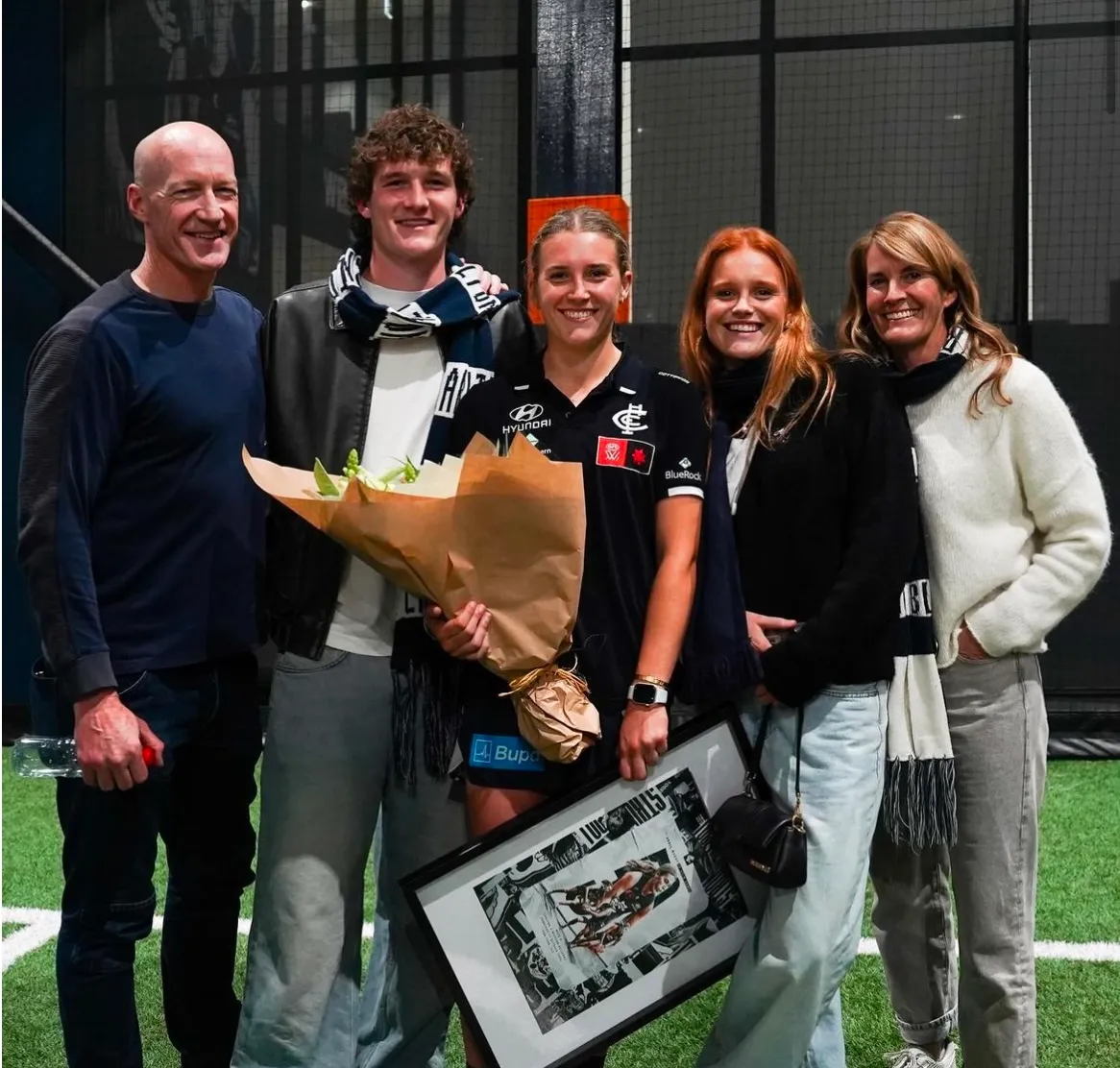

The McKay family celebrate Abbie's 50 game milestone at Carlton Football Club



The McKay family celebrate Abbie's 50 game milestone at Carlton Football Club


The McKay family celebrate Abbie's 50 game milestone at Carlton Football Club

Tell us about some of the challenges you’ve faced playing AFL and AFLW
Andrew “Moving interstate when I was drafted and then leaving Melbourne to study in Brisbane for a year while still plating for Carlton in Melbourne. Balancing football and study. The biggest challenge for footballers is injuries, particularly nowadays.”
Abbie “From an AFLW point of view, I think we’re always facing challenges. We have come a long way. For example, we used to train at night and now we train in the day. I think the goal in the end would be to be like the boys and be full-time athletes. So, we’re always facing challenges, but I think we’ve come a long way.
On a personal note, I played four games in my first year and then in my second year, I didn’t get selected into the playing side, which from an outsider’s point of view may not seem that bad. But when you are dedicating your life to training that hard and you’ve done the whole pre-season and you don’t get to play a game the entire year, it takes a toll on you.”
Andrew “Abs had come off her second season and didn’t get a game, so she wanted to improve and make sure she was very fit and healthy when she went back to pre-season training. We were able to work on that during COVID, which was good. I think that was a real turning point in her footy mindset and career.The fact that Abbie didn't get picked in the second year to play any games was actually a lesson for the whole family. I experienced it particularly when I went back and administered at Carlton. Watching boys, and then girls, not getting to play is really heartbreaking for them. They're there to play footy and when they are not getting picked it's a real challenge, and can create all sorts of issues”
Sophie “The biggest challenge for me is my [shoulder] injury and my number one goal is having that rehabilitated. It’s my first big injury. It’s been a slow process. For my future goals, it all comes back for me to having fun. If I'm having fun, I'm going to want to put in the work. I did witness first-hand through Abbie how hard work beats talent.
Another big challenge is performing at my best in both studies and football at the same time. I know everyone talks about not having all your eggs in one basket, but it’s really hard not to when you want to perform your best. So, it’s a balancing act and also sacrificing some days to get the results I want.”
How do you manage to balance football with the other elements of your life like work or study?
Abbie “I don't want to say it’s the hardest, but the yeah, it’s a bit of a juggling act. In pre-season, we trained three times a week and we do full days. So, we get there at about 10 am and leave around 6 pm on Tuesday, Thursday and Saturday. And then, when we are in season, the training days become a little bit shorter, but we have more of them. You have to be able to fit work around those commitments. It means having bosses that are really flexible and know that you can't work on very specific days of the week.”
Sophie “Obviously, the balance is very challenging, but the School has been absolutely wonderful. They allowed me to just do four subjects this year in VCE, which gives me quite a bit of free time because obviously my time after school is really limited during season, so having those couple of hours in school where I can do the work that I need to at home is extremely helpful and takes the load off a lot. I always feel really celebrated at school, which keeps me going. When it does get overwhelming, there's always support available.”
Talk to us about the importance of sport for women and young people
Andrew “Whether it be football or other sports, just to get them active or get them outside enjoying things other than screens inside, I think it's extremely important, extremely good for their wellbeing and their mental health. Sport creates a more rounded human being in the end.”
Sophie “I think honestly, as a teenage girl in this day and age, when I'm doing a footy training, it's the first time throughout the day I don't think about my phone, and I don't think about going on Instagram, so I think that is really important.”
Abbie “I've met all my friends through sport. It's a great way to make new friends from different schools or different places. I absolutely loved playing sport at MGGS, and I think it has turned me into the person I am today. So, it’s very, very important to keep encouraging it.”
Tell us about some of the challenges you’ve faced playing AFL and AFLW
Andrew “Moving interstate when I was drafted and then leaving Melbourne to study in Brisbane for a year while still plating for Carlton in Melbourne. Balancing football and study. The biggest challenge for footballers is injuries, particularly nowadays.”
Abbie “From an AFLW point of view, I think we’re always facing challenges. We have come a long way. For example, we used to train at night and now we train in the day. I think the goal in the end would be to be like the boys and be full-time athletes. So, we’re always facing challenges, but I think we’ve come a long way.
On a personal note, I played four games in my first year and then in my second year, I didn’t get selected into the playing side, which from an outsider’s point of view may not seem that bad. But when you are dedicating your life to training that hard and you’ve done the whole pre-season and you don’t get to play a game the entire year, it takes a toll on you.”
Andrew “Abs had come off her second season and didn’t get a game, so she wanted to improve and make sure she was very fit and healthy when she went back to pre-season training. We were able to work on that during COVID, which was good. I think that was a real turning point in her footy mindset and career.The fact that Abbie didn't get picked in the second year to play any games was actually a lesson for the whole family. I experienced it particularly when I went back and administered at Carlton. Watching boys, and then girls, not getting to play is really heartbreaking for them. They're there to play footy and when they are not getting picked it's a real challenge, and can create all sorts of issues”
Sophie “The biggest challenge for me is my [shoulder] injury and my number one goal is having that rehabilitated. It’s my first big injury. It’s been a slow process. For my future goals, it all comes back for me to having fun. If I'm having fun, I'm going to want to put in the work. I did witness first-hand through Abbie how hard work beats talent.
Another big challenge is performing at my best in both studies and football at the same time. I know everyone talks about not having all your eggs in one basket, but it’s really hard not to when you want to perform your best. So, it’s a balancing act and also sacrificing some days to get the results I want.”
How do you manage to balance football with the other elements of your life like work or study?
Abbie “I don't want to say it’s the hardest, but the yeah, it’s a bit of a juggling act. In pre-season, we trained three times a week and we do full days. So, we get there at about 10 am and leave around 6 pm on Tuesday, Thursday and Saturday. And then, when we are in season, the training days become a little bit shorter, but we have more of them. You have to be able to fit work around those commitments. It means having bosses that are really flexible and know that you can't work on very specific days of the week.”
Sophie “Obviously, the balance is very challenging, but the School has been absolutely wonderful. They allowed me to just do four subjects this year in VCE, which gives me quite a bit of free time because obviously my time after school is really limited during season, so having those couple of hours in school where I can do the work that I need to at home is extremely helpful and takes the load off a lot. I always feel really celebrated at school, which keeps me going. When it does get overwhelming, there's always support available.”
Talk to us about the importance of sport for women and young people
Andrew “Whether it be football or other sports, just to get them active or get them outside enjoying things other than screens inside, I think it's extremely important, extremely good for their wellbeing and their mental health. Sport creates a more rounded human being in the end.”
Sophie “I think honestly, as a teenage girl in this day and age, when I'm doing a footy training, it's the first time throughout the day I don't think about my phone, and I don't think about going on Instagram, so I think that is really important.”
Abbie “I've met all my friends through sport. It's a great way to make new friends from different schools or different places. I absolutely loved playing sport at MGGS, and I think it has turned me into the person I am today. So, it’s very, very important to keep encouraging it.”
Tell us about some of the challenges you’ve faced playing AFL and AFLW
Andrew “Moving interstate when I was drafted and then leaving Melbourne to study in Brisbane for a year while still plating for Carlton in Melbourne. Balancing football and study. The biggest challenge for footballers is injuries, particularly nowadays.”
Abbie “From an AFLW point of view, I think we’re always facing challenges. We have come a long way. For example, we used to train at night and now we train in the day. I think the goal in the end would be to be like the boys and be full-time athletes. So, we’re always facing challenges, but I think we’ve come a long way.
On a personal note, I played four games in my first year and then in my second year, I didn’t get selected into the playing side, which from an outsider’s point of view may not seem that bad. But when you are dedicating your life to training that hard and you’ve done the whole pre-season and you don’t get to play a game the entire year, it takes a toll on you.”
Andrew “Abs had come off her second season and didn’t get a game, so she wanted to improve and make sure she was very fit and healthy when she went back to pre-season training. We were able to work on that during COVID, which was good. I think that was a real turning point in her footy mindset and career.The fact that Abbie didn't get picked in the second year to play any games was actually a lesson for the whole family. I experienced it particularly when I went back and administered at Carlton. Watching boys, and then girls, not getting to play is really heartbreaking for them. They're there to play footy and when they are not getting picked it's a real challenge, and can create all sorts of issues”
Sophie “The biggest challenge for me is my [shoulder] injury and my number one goal is having that rehabilitated. It’s my first big injury. It’s been a slow process. For my future goals, it all comes back for me to having fun. If I'm having fun, I'm going to want to put in the work. I did witness first-hand through Abbie how hard work beats talent.
Another big challenge is performing at my best in both studies and football at the same time. I know everyone talks about not having all your eggs in one basket, but it’s really hard not to when you want to perform your best. So, it’s a balancing act and also sacrificing some days to get the results I want.”
How do you manage to balance football with the other elements of your life like work or study?
Abbie “I don't want to say it’s the hardest, but the yeah, it’s a bit of a juggling act. In pre-season, we trained three times a week and we do full days. So, we get there at about 10 am and leave around 6 pm on Tuesday, Thursday and Saturday. And then, when we are in season, the training days become a little bit shorter, but we have more of them. You have to be able to fit work around those commitments. It means having bosses that are really flexible and know that you can't work on very specific days of the week.”
Sophie “Obviously, the balance is very challenging, but the School has been absolutely wonderful. They allowed me to just do four subjects this year in VCE, which gives me quite a bit of free time because obviously my time after school is really limited during season, so having those couple of hours in school where I can do the work that I need to at home is extremely helpful and takes the load off a lot. I always feel really celebrated at school, which keeps me going. When it does get overwhelming, there's always support available.”
Talk to us about the importance of sport for women and young people
Andrew “Whether it be football or other sports, just to get them active or get them outside enjoying things other than screens inside, I think it's extremely important, extremely good for their wellbeing and their mental health. Sport creates a more rounded human being in the end.”
Sophie “I think honestly, as a teenage girl in this day and age, when I'm doing a footy training, it's the first time throughout the day I don't think about my phone, and I don't think about going on Instagram, so I think that is really important.”
Abbie “I've met all my friends through sport. It's a great way to make new friends from different schools or different places. I absolutely loved playing sport at MGGS, and I think it has turned me into the person I am today. So, it’s very, very important to keep encouraging it.”
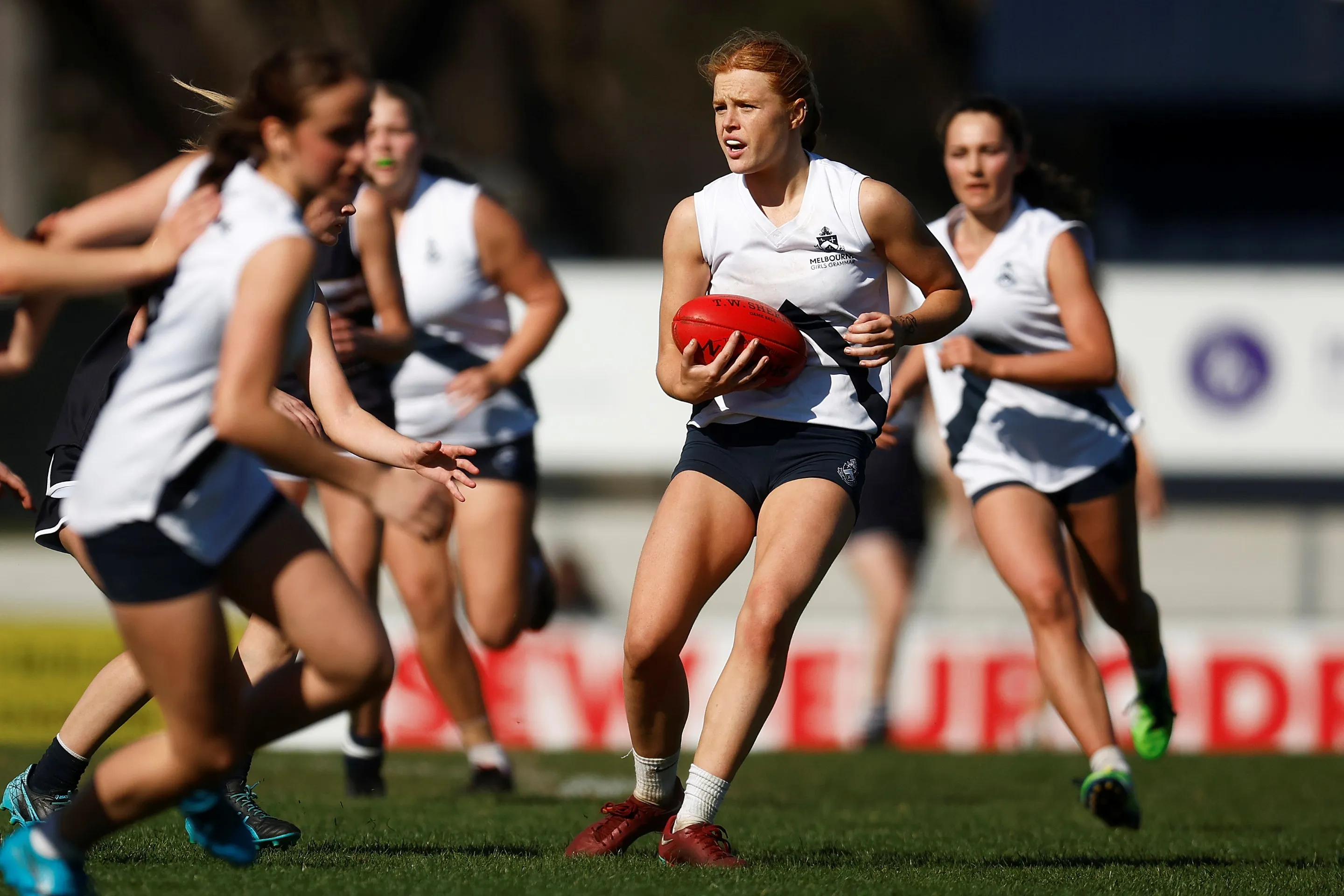

Sophie in the 2023 AFL Victoria Herald Sun Shield Grand-Final



Sophie in the 2023 AFL Victoria Herald Sun Shield Grand-Final
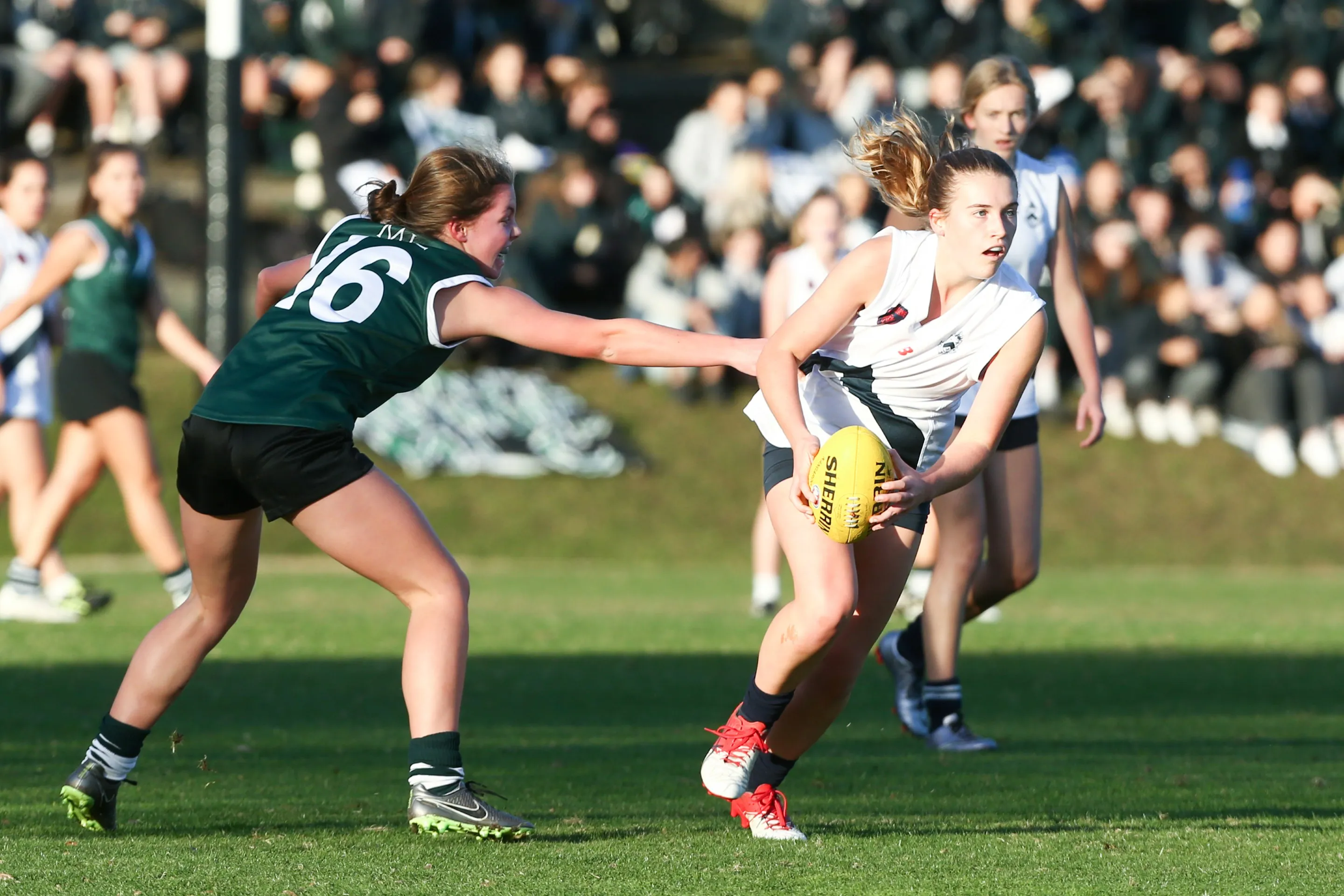

Abbie playing GSV AFL for MGGS
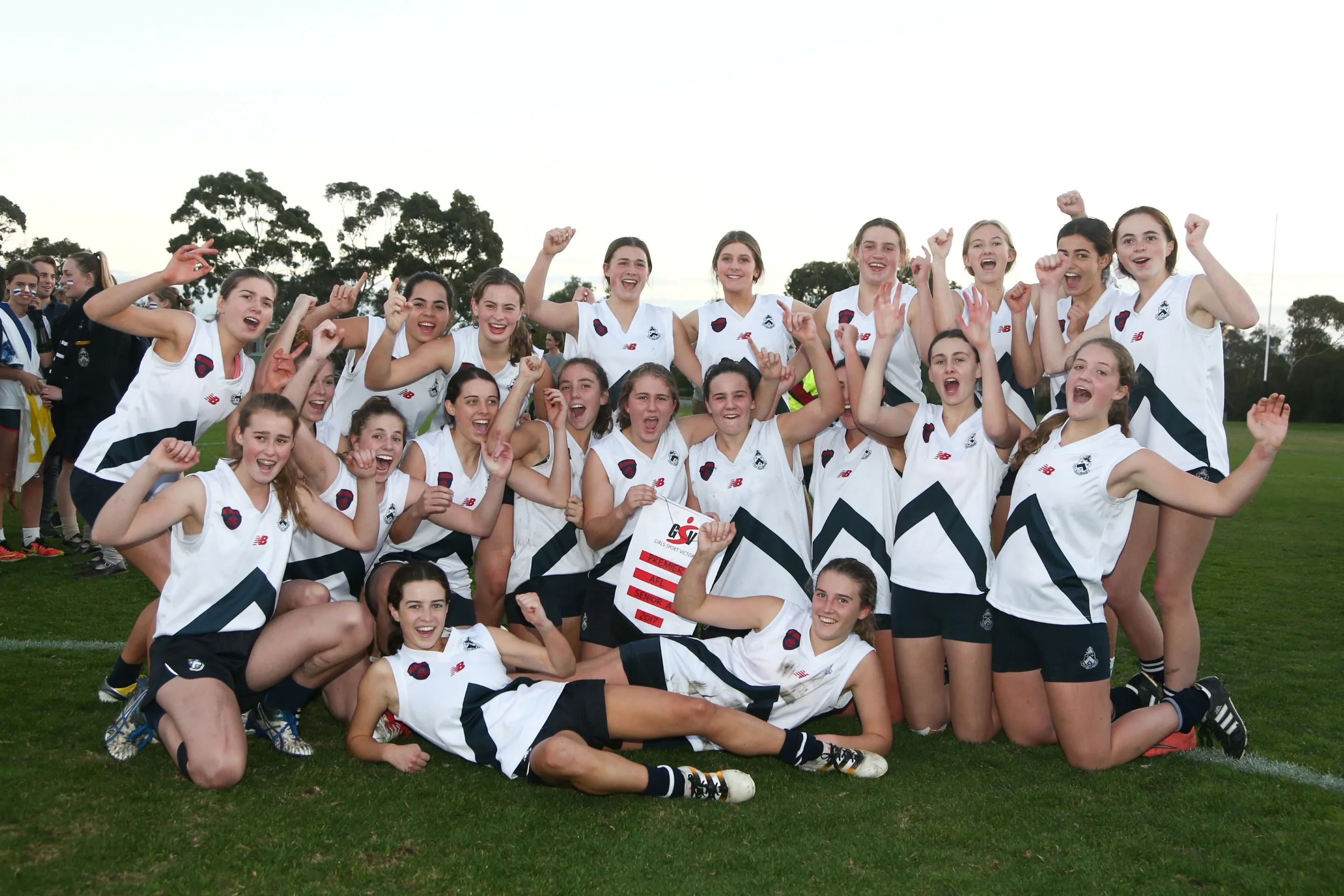

Abbie's GSV Premiership winning football team in 2017
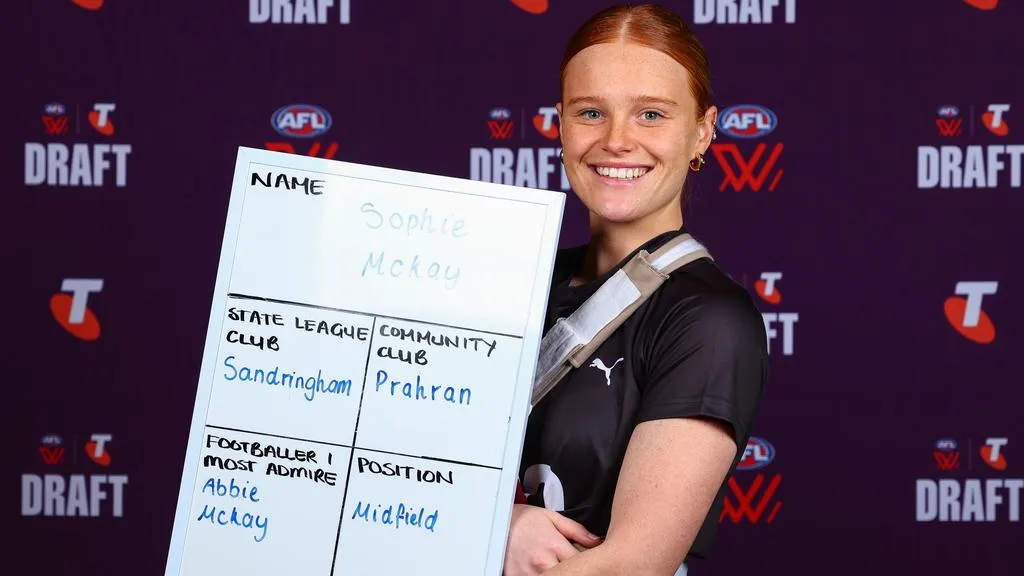

Sophie prepares for the 2024 AFLW Draft


Sophie in the 2023 AFL Victoria Herald Sun Shield Grand-Final


Abbie playing GSV AFL for MGGS


Abbie's GSV Premiership winning football team in 2017


Sophie prepares for the 2024 AFLW Draft
Sophie in the 2023 AFL Victoria Herald Sun Shield Grand-Final

What would you like your legacy to be?
Sophie “I haven’t even been drafted yet, but the style of the game is really developing and hopefully I can play a part in that. Celebrating and creating a game that’s just as fast as the boys’ or has just as much flair as the boys’ and transforming not only the skill, but the speed and the style of the game. I think it would be really great to see that.”
Abbie “In terms of legacy, I think I know that I'm probably not going to be in AFLW when it goes full time, but I like to think that hopefully I did my part in getting the Women’s League to that point.
I'm just one of many people that will help get the Women’s League to move to full time and be as big as the men's program.”
What advice would you give to an MGGS student looking to pursue a career in sport?
Abbie – “If you want to do it, just have a crack. I didn’t think I could get there, but hard work and passion will get you there in the end. Continue having fun and make sure you're working hard, and you'll get there in the end.”
Sophie “Yeah, I would never have gone into footy if I didn’t just give it a crack. The only reason I started back at footy is because I went to a family day at Carlton and ended up walking away knowing that’s what I wanted to do. That wouldn’t have happened without me just giving it a shot and shifting my mindset.
What would you like your legacy to be?
Sophie “I haven’t even been drafted yet, but the style of the game is really developing and hopefully I can play a part in that. Celebrating and creating a game that’s just as fast as the boys’ or has just as much flair as the boys’ and transforming not only the skill, but the speed and the style of the game. I think it would be really great to see that.”
Abbie “In terms of legacy, I think I know that I'm probably not going to be in AFLW when it goes full time, but I like to think that hopefully I did my part in getting the Women’s League to that point.
I'm just one of many people that will help get the Women’s League to move to full time and be as big as the men's program.”
What advice would you give to an MGGS student looking to pursue a career in sport?
Abbie – “If you want to do it, just have a crack. I didn’t think I could get there, but hard work and passion will get you there in the end. Continue having fun and make sure you're working hard, and you'll get there in the end.”
Sophie “Yeah, I would never have gone into footy if I didn’t just give it a crack. The only reason I started back at footy is because I went to a family day at Carlton and ended up walking away knowing that’s what I wanted to do. That wouldn’t have happened without me just giving it a shot and shifting my mindset.
What would you like your legacy to be?
Sophie “I haven’t even been drafted yet, but the style of the game is really developing and hopefully I can play a part in that. Celebrating and creating a game that’s just as fast as the boys’ or has just as much flair as the boys’ and transforming not only the skill, but the speed and the style of the game. I think it would be really great to see that.”
Abbie “In terms of legacy, I think I know that I'm probably not going to be in AFLW when it goes full time, but I like to think that hopefully I did my part in getting the Women’s League to that point.
I'm just one of many people that will help get the Women’s League to move to full time and be as big as the men's program.”
What advice would you give to an MGGS student looking to pursue a career in sport?
Abbie – “If you want to do it, just have a crack. I didn’t think I could get there, but hard work and passion will get you there in the end. Continue having fun and make sure you're working hard, and you'll get there in the end.”
Sophie “Yeah, I would never have gone into footy if I didn’t just give it a crack. The only reason I started back at footy is because I went to a family day at Carlton and ended up walking away knowing that’s what I wanted to do. That wouldn’t have happened without me just giving it a shot and shifting my mindset.
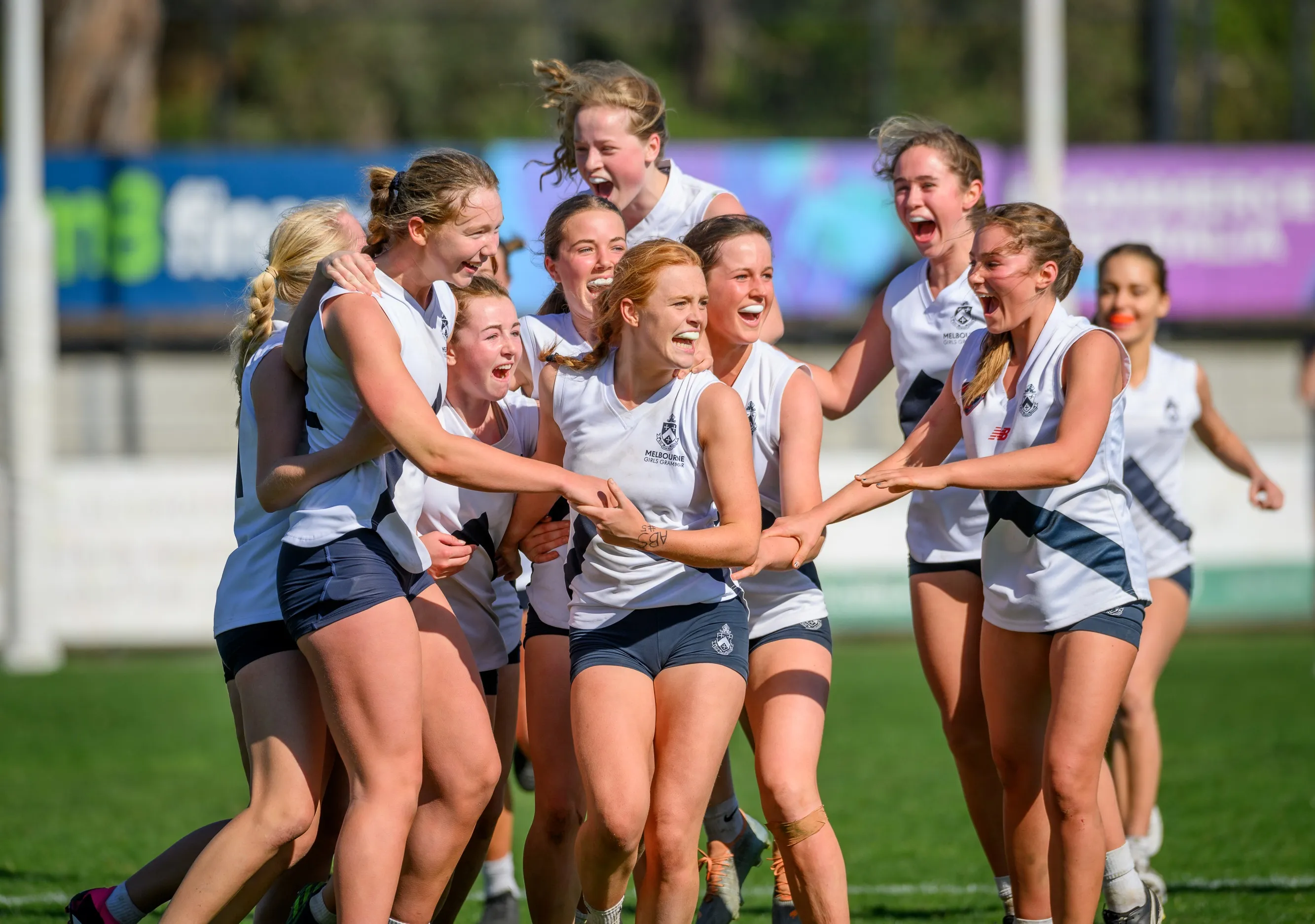

Special moments playing for MGGS



Special moments playing for MGGS
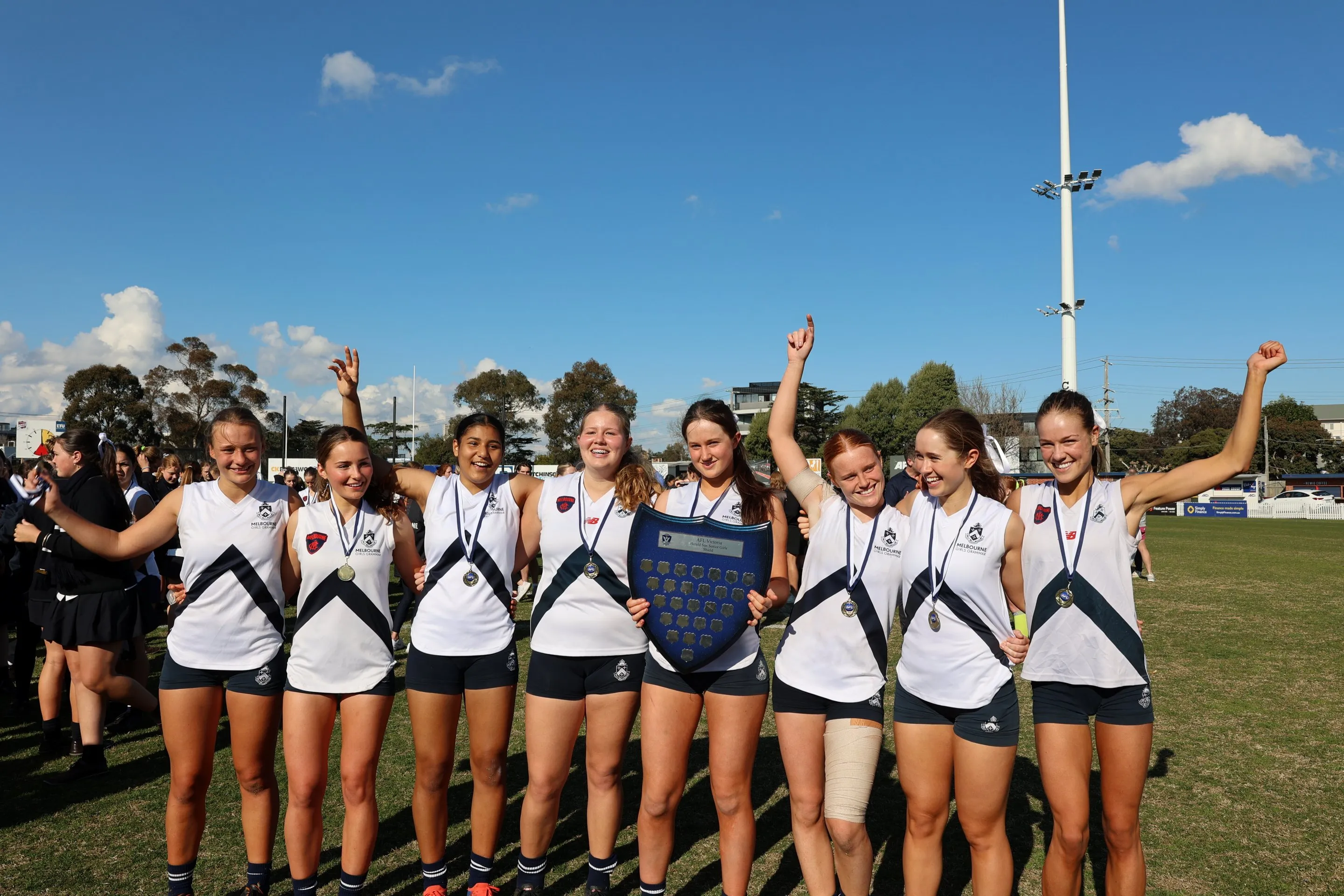

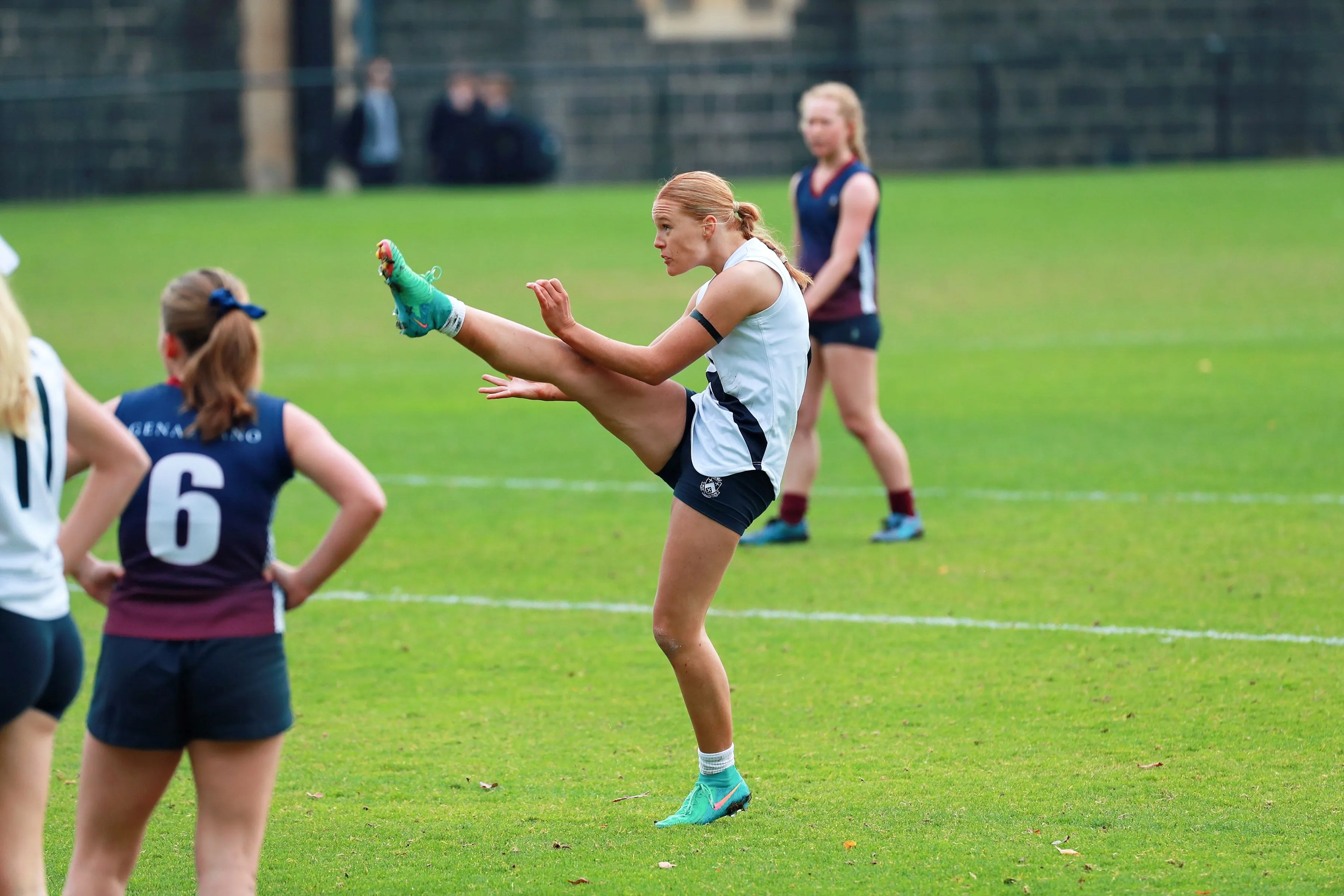





Special moments playing for MGGS














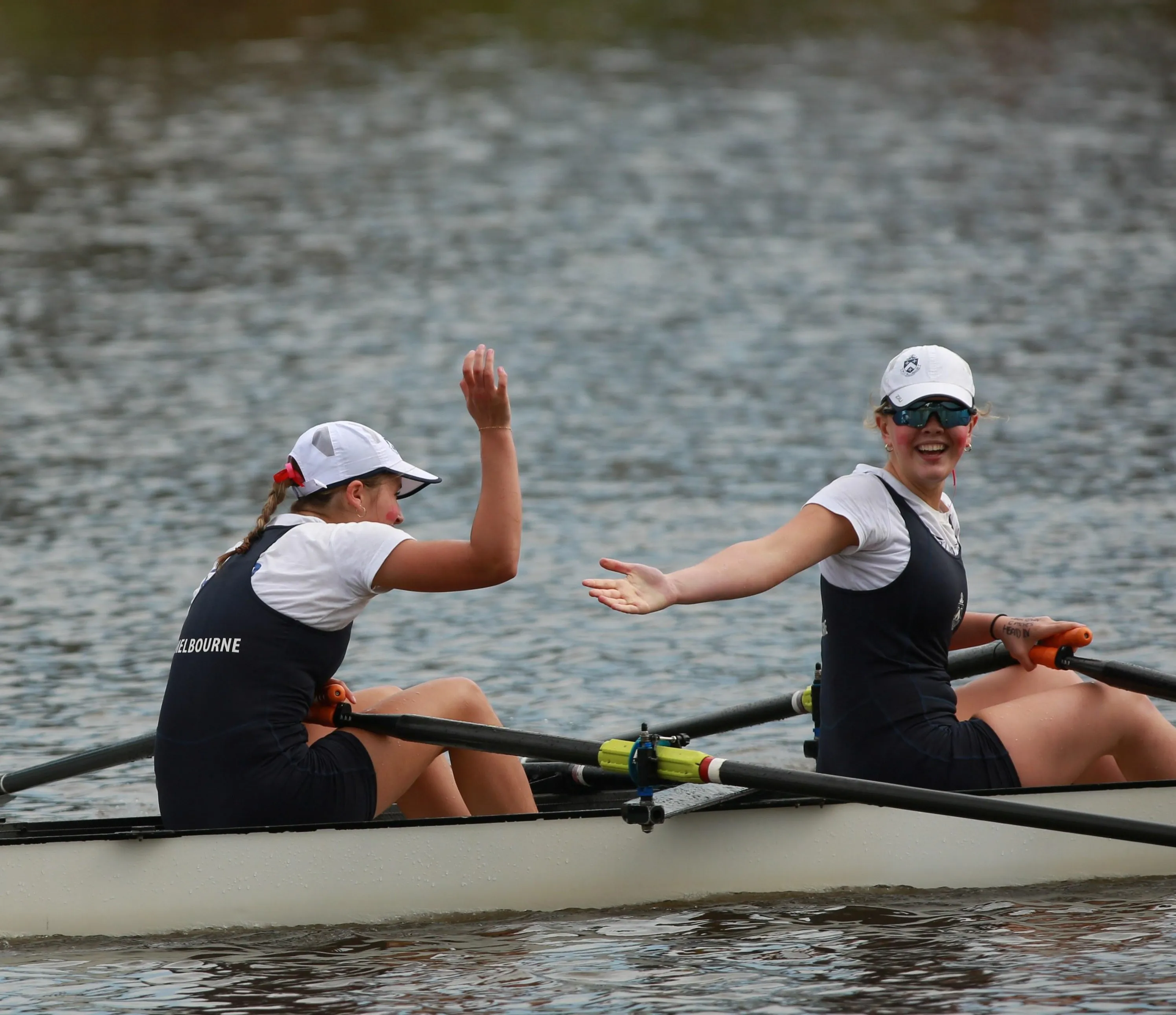
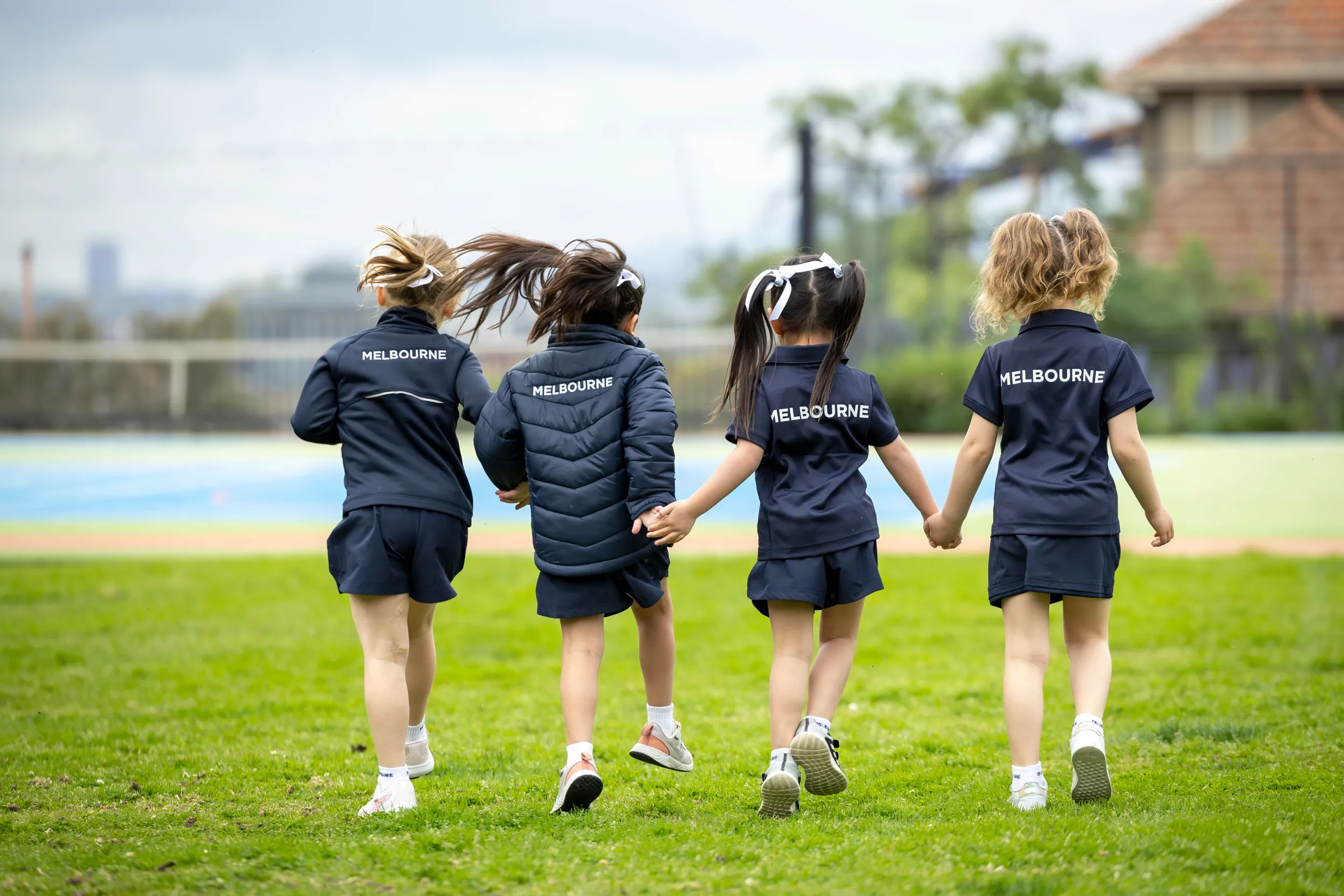
.webp)
.webp)
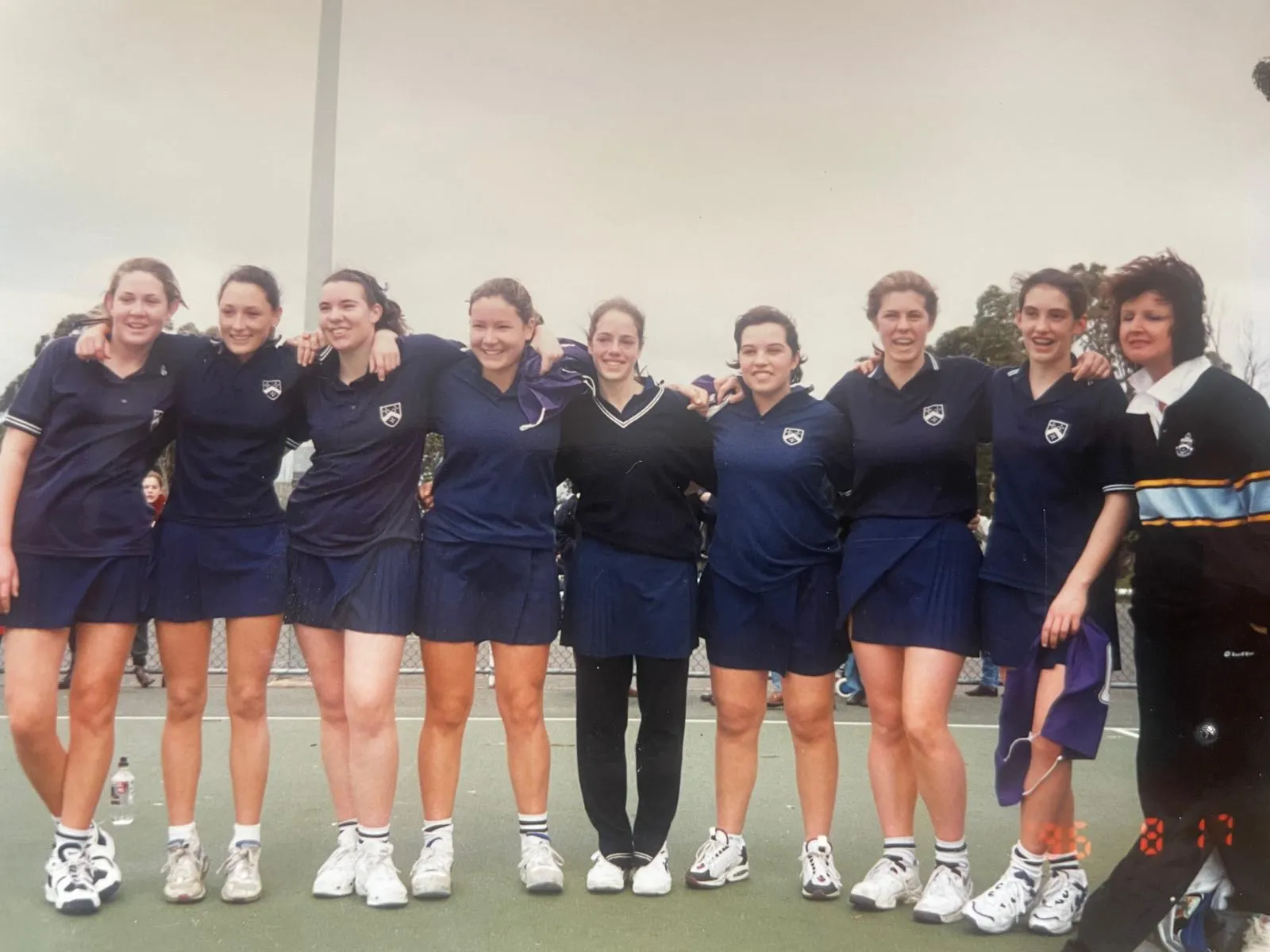
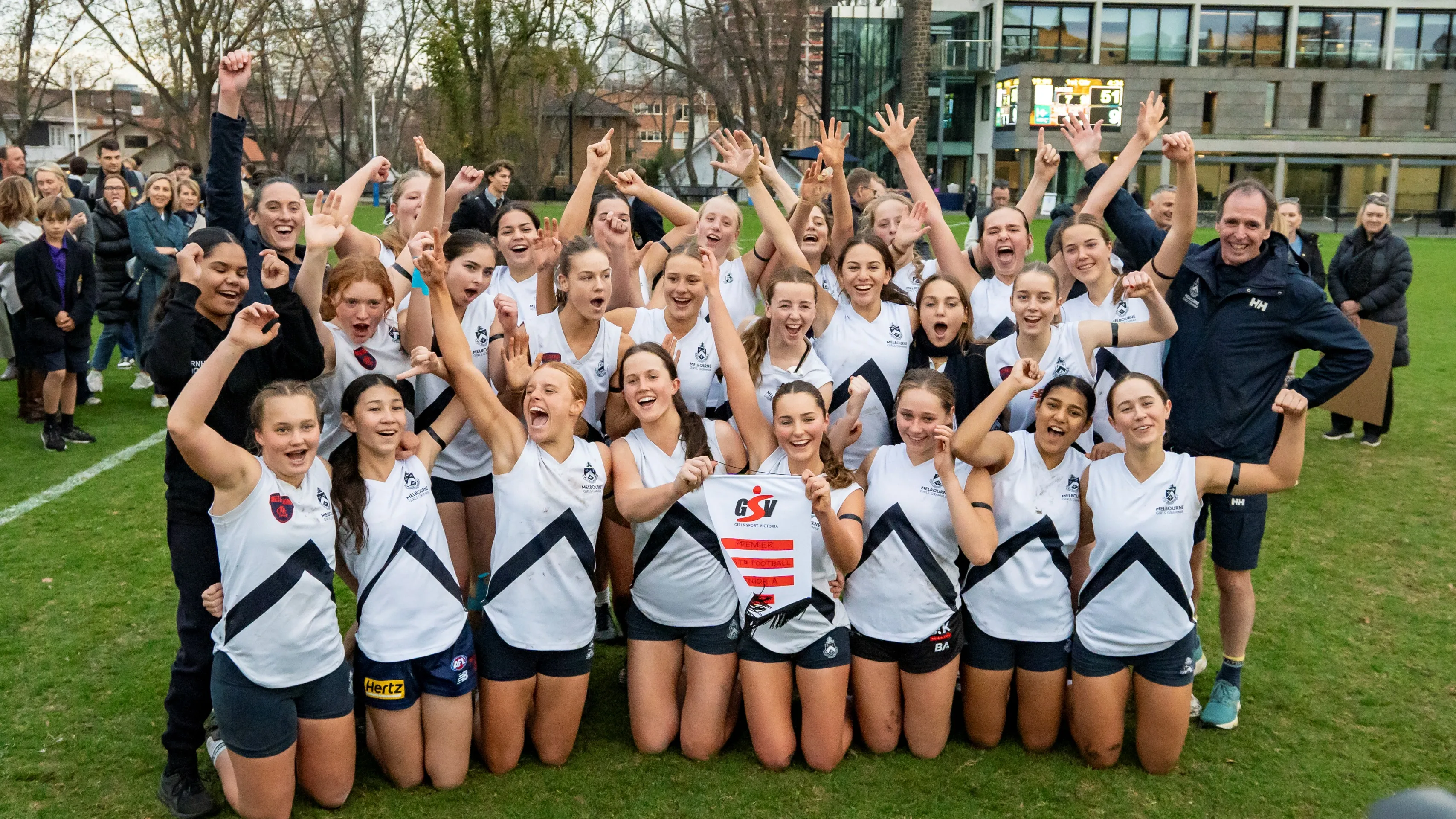
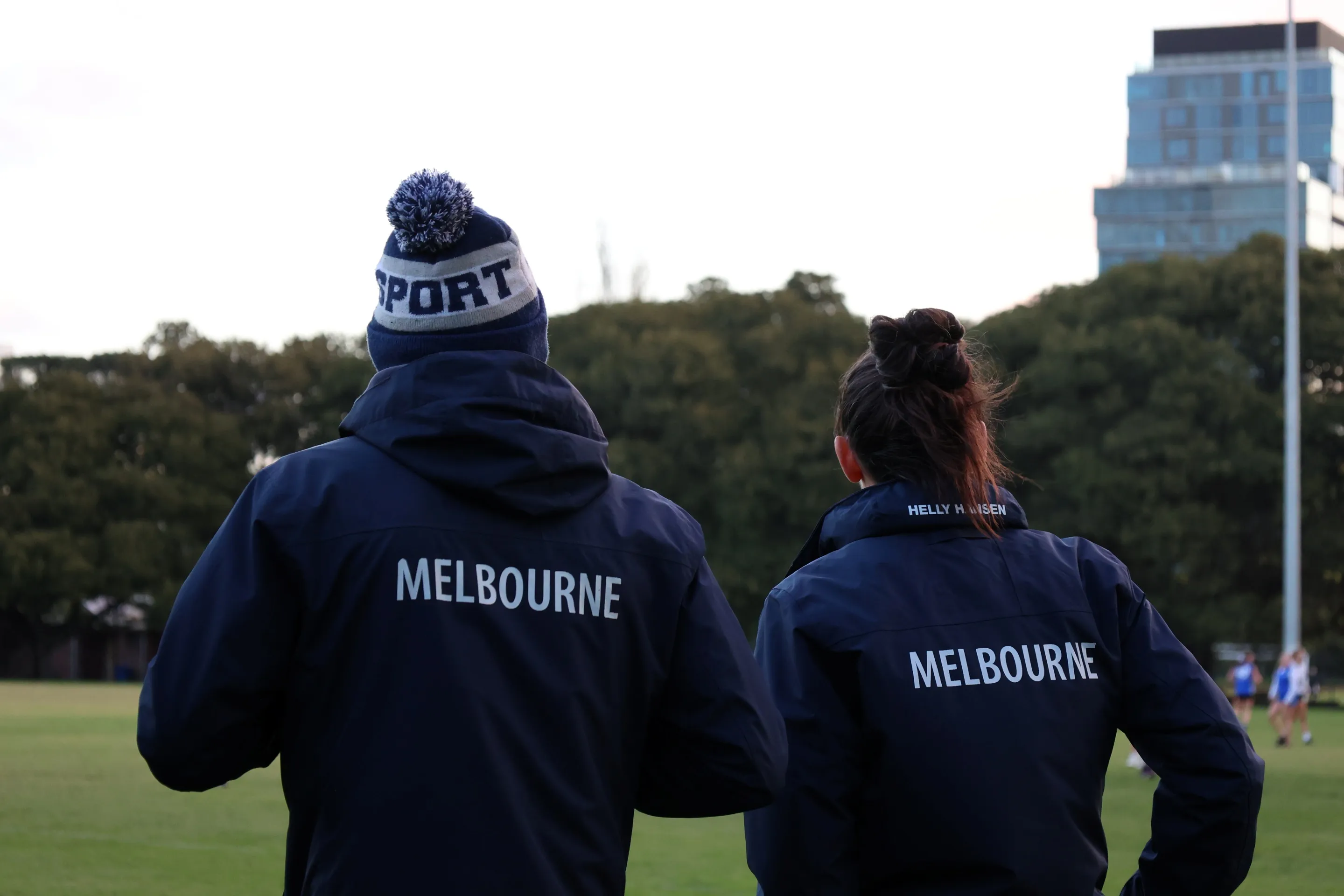
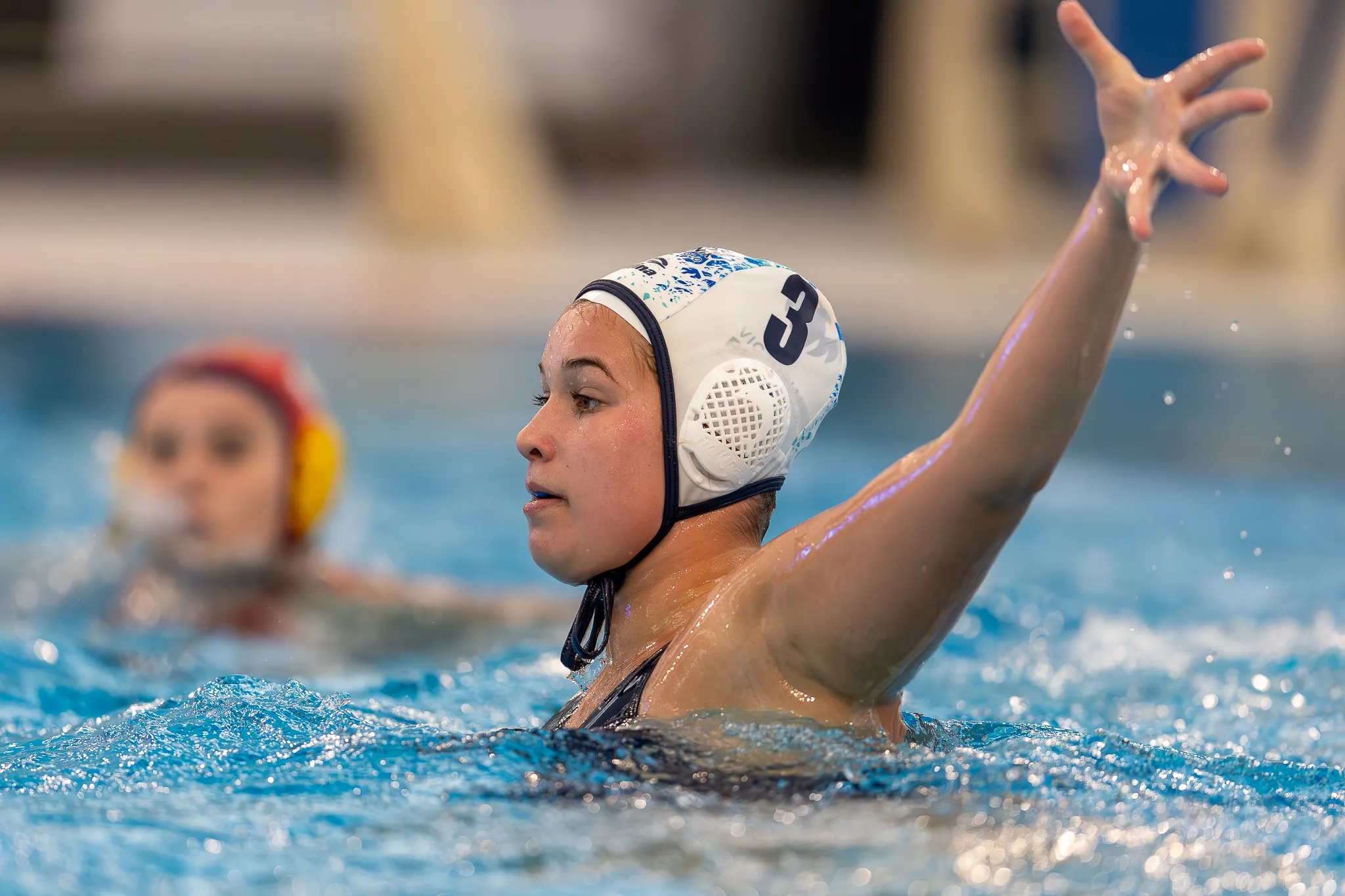
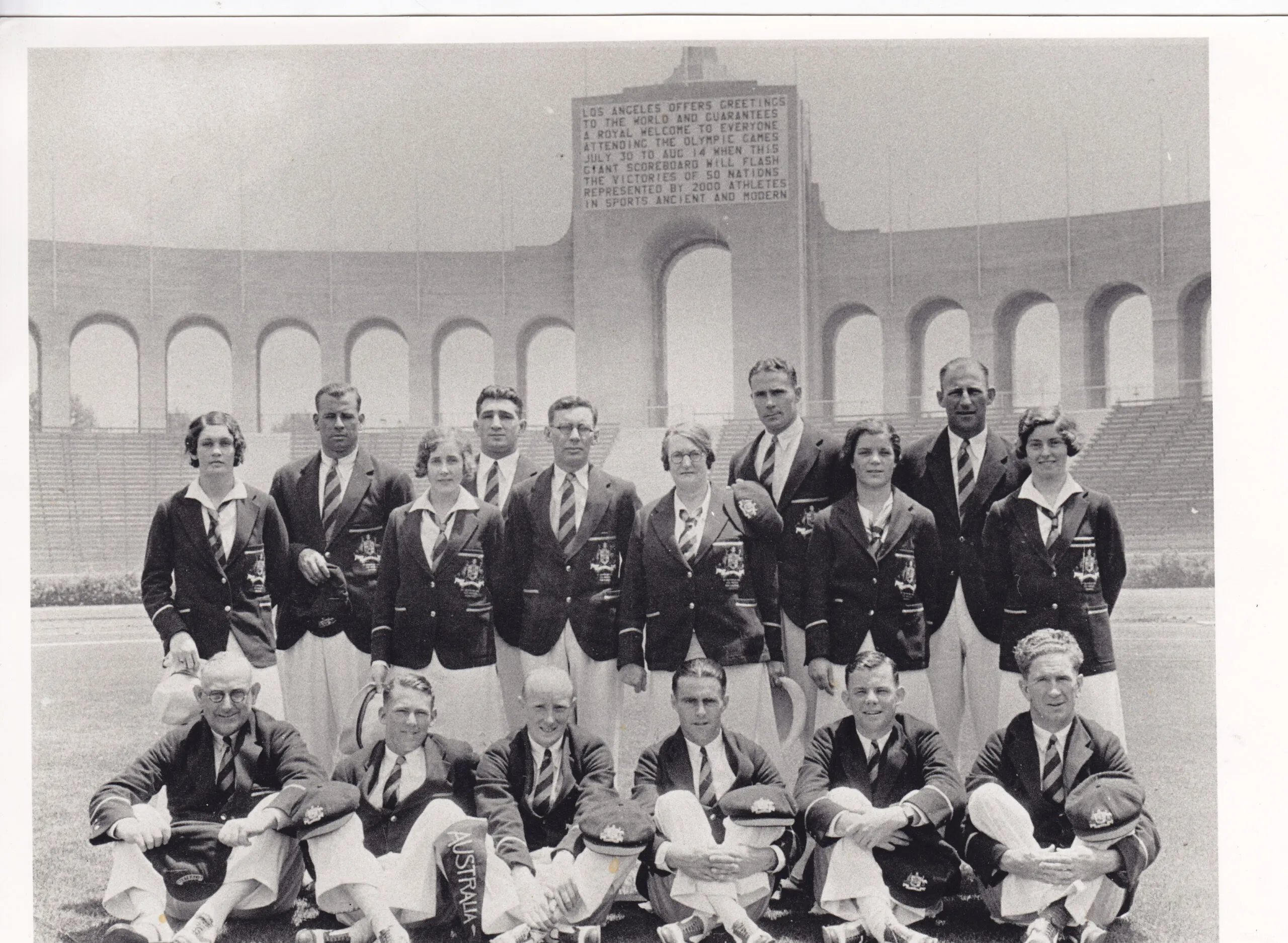
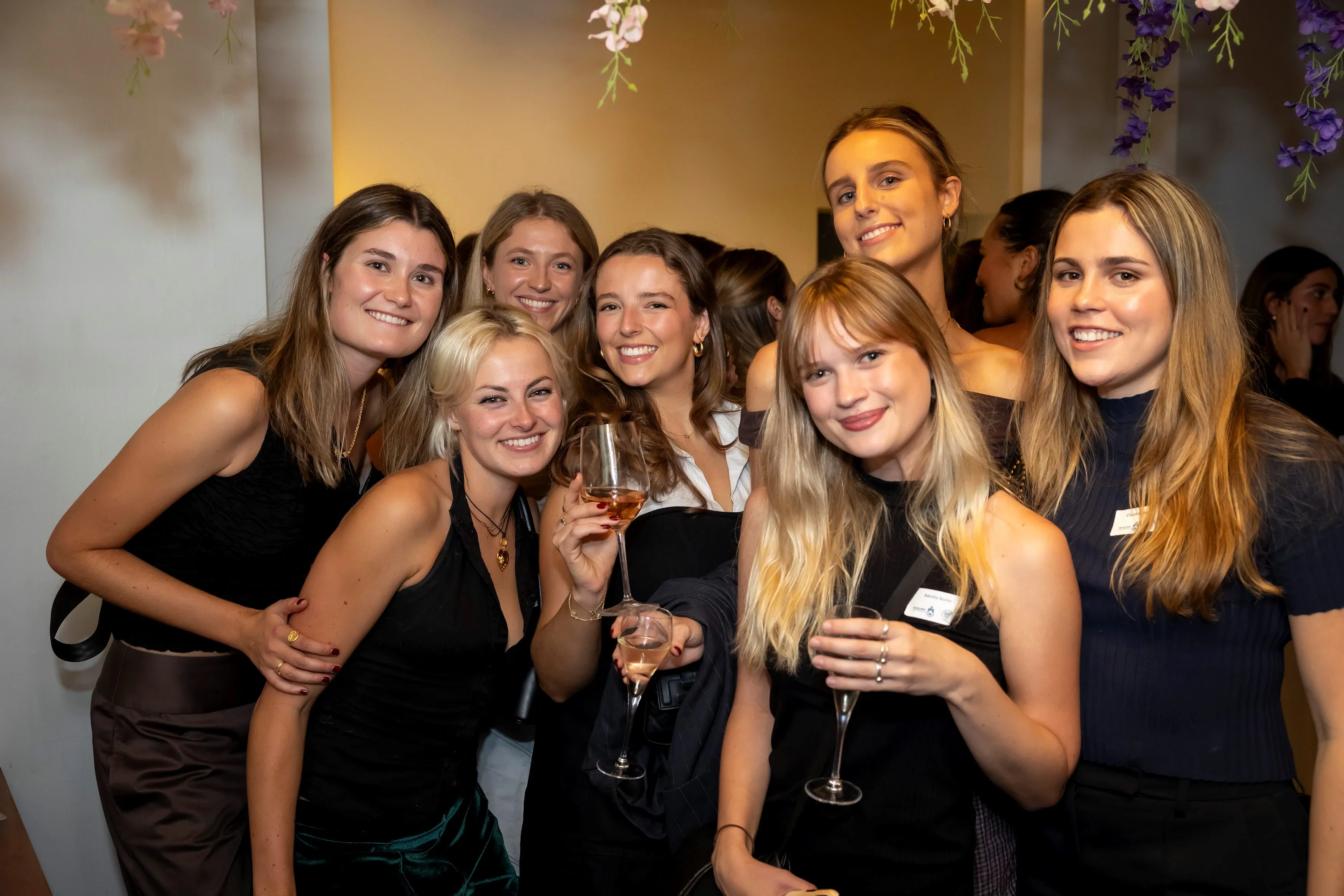
%20landscape.webp)
